#And might not make any sense to more individualistic cultures
Text
Man I would love seeing more non-western readings of Houseki no Kuni
#houseki no kuni#hnk spoilers#Or at least readings by someone with a greater understanding of different branches of Buddhism#And of the role of an individual in Japanese culture#Bc surprise a Japanese story made for a majorly Japanese audience will not have the same social morals as what you're used to#I see a lot of people wishing for Phos to leave literally everyone hanging and I'm here like Bruh.#This ain't your revenge fantasy scenario#It was always about suffering caused by the self and impernance#by highlighting the stagnancy of the descendants of humanity and how Phos is the only one to go through significant change#If anything#If Phos is able to overcome their suffering and reaches enlightenment#If they become a Buddha basically#They would also become a guide to end the suffering of others#Whether that's an obligation or just. the right thing to do.#Because what else are you gonna do with an eternity in your hands#EDIT?: Actually 'social morals' is not the right word for this 'social norm' fits better#Like 'moral' would imply what is seen as 'good' which isn't what I'm going for#Like karoshi (death by overwork) isn't Moral or good even by Japanese standards#but it is. kinda seen as a norm.#And might not make any sense to more individualistic cultures#Also let's make it clear I'd LOVE for the lunarians and gems (and admirabilis?) to put in the work to escape the cycle of death and rebirth#Part of which is at least an apology to Phos
37 notes
·
View notes
Note
This might sound transphobic maybe (?) But as someone who is trans myself I promise it's not meant that way.
I was wondering about what exactly it means in the Clans to be a tom, molly, neither, etc. And to transition fron one to another. (Regarding your post however long ago about how they don't label things and just say stuff like "she was a tom and now she's a molly") Basically I'm asking what's the concept of gender/gender roles for them if that makes sense? I didnt notice any clear differences between treatment or opportunity for them but I also haven't read it in awhile so what I do remember at all is kinda fuzzy, and generally male and female cats don't look much different so I guess I'm just curious if it's just more of a vibe thing or not /gen
Again sorry if this is weird to ask!!
No you're good I love transphobia <3
All joking aside, the clans very much do not have gender roles! Transness therefore looks very different to them. While it sometimes comes with bodily dysphoria (for instance, Russetfur does not like any of the tom characteristics she has. When she takes a mate and they have kittens, she opts for a surrogate instead of siring the kittens herself due to that dysphoria) it usually has more to do with identity and, to a point, parenthood.
A lot of the time, a cat becomes because they want to honour or embody a piece of someone else. If Whitestorm had lived, he would have decided to be a molly based on his close relationships with the mollies in his life, especially Bluestar and Frostfur. What that means is different to every cat, about as individualistic as transness in real life.
And then sometimes it has to do with parenthood. Redtail lies more in this category--he related heavily to his father, Thrushpelt, and they were a big influence on why he decided to be a tom. Things went a little awry when he had kittens, because he had trouble reconciling that with his identity, but once he no longer needed to nurse them he felt a lot better about being a parent.
Mossflower is also a good example! Before she had Greystripe, Mossflower identified as a tom. When she had her first litter, though, she decided she wanted to be a mother (has to do with her feelings around Bluestar, who was very distant, and Rosetail, who helped raise her in Bluestar's stead). In Darkest Hour, she'll make the decision to return to tomhood, because she's finished having kittens and isn't as much a mother anymore (to that point, though, her kittens will continue to call her mom!)
The Town cats are a different story, though. They don't have much of a central sort of culture, so gender can range from being very tied to sex to not at all. Brick has no strong feelings about anything to do with their sex OR gender, hence the they/them pronouns. When they eventually got neutered, they weren't too bent out of shape about it--and in fact they found they enjoyed the new hormone-free mindset.
#whether or not there are gender roles in the Town is up for debate#cus obviously being a queen and raising kittens is difficult#haven't put too much thought into it tbh#rewrite stuff
66 notes
·
View notes
Note
What kind of relations do the Nordics have outside ecah other? Friends etc.!
Oh, interesting!
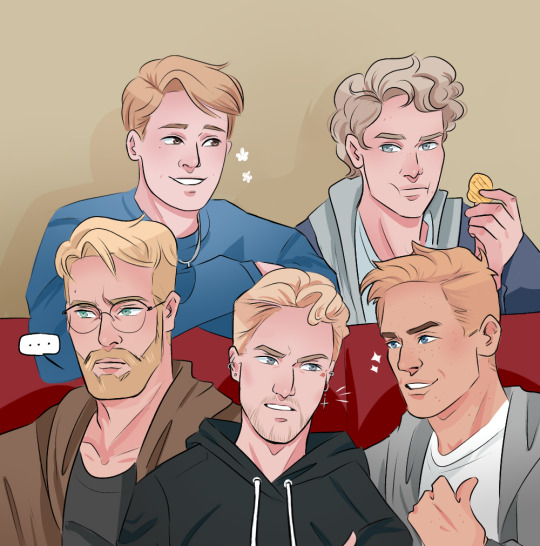
Nordic countries are notoriously bad when it comes to making friends. Their culture is very individualistic and independent, and preexisting friend groups are hard to break into, so I don't think they would have that many friends! They're all introverted and quiet, so making meaningful connections doesn't come to them naturally. Some might find them hard to approach, but they're not mean - Just incredibly awkward at social gatherings. They're always the ones to avoid the biggest crowds and leave very early, usually without telling anyone.
Also, the concept of friendship is different in these cultures. Nordic people tend to have a dozen pals or buddies but only a few legit friends they would genuinely open up to. Having as many "friends" as possible is not a goal and might even be considered pretentious. But due to their job, Nordics are very professional and open countries diplomatically, so in work-related settings, they get along with anyone (once they overcome their shyness). It's just that in their personal lives, they likely just prefer each other. They don't seek friendships outside the Nordics, as they feel maintaining friendships with each other is hard as it is!
But with all of that said, these guys don't exist in a bubble, and they do have relations outside of their family
• • • • • • • • • •
Denmark
Denmark has probably the most relations out of all the Nordics due to his job and position. With other introverts, Denmark is very talkative and outgoing, usually taking the leading role, but if he needs to work with other extroverts, he suddenly becomes the quiet one. He has managed to make friends but has difficulty maintaining said relationships. His phone is always filled with unanswered calls and messages. Denmark can come off as rude or even arrogant, but he just has that Nordic straightforwardness. And he avoids small talk with strangers as much as possible; it makes him feel awkward. Generally speaking, he's a known name around the circles. As a former European power, a founding member of NATO, and a long-time member of the EU, Den has been a prominent diplomat in Western circles. But that also means he sides with the people around him in any given situation and follows their lead for his and his family's best interest.
He considers the German duo his friends, especially Prussia, whom he has known for a long time and always had a sense of rivalry with, sometimes friendly, sometimes serious. Germany has a business-first attitude, but even he eases up outside work hours. Because Germany is so young, Denmark sometimes takes an uncle role with him and pretends to be much more mature and wiser than he is. Denmark is often invited to the Germans' gatherings and parties, which he frequently attends, and has gotten a reputation as a bit of a party animal among other Europeans. Denmark is very dependent on Germans, and borderline bothers them at work, proposing ideas during meetings, making jokes, and always trying to sell something to them. But Denmark's an important promoter for all the other Nordics' issues. He still acts as the family's boss, handling matters with the rest of continental Europe. Of course, this means Den is on great terms with France and the Benelux siblings, who he shares long historical connections with. England is also an important ally, but he's still uneasy around Denmark. He can still remember how ruthless Denmark used to be growing up and will most likely never get over his primitive fear of him. While everyone else sees Den as a golden retriever, England isn't letting his guard down.
Denmark is friendly with the Baltics, though he can oftentimes forget or overlook them in a bigger crowd. They have a long history, but their first encounters weren't positive. Not many countries can say that about Denmark anyway; he was quite the troublemaker. However, during modern times, the Baltics don't have anything against Denmark other than him being noisy and pesky sometimes. He has been a significant ally after the Baltic's independence. They get along better than many other nations, as they have known each other for a long time, share Northern European/Baltic Sea culture, and could be considered family friends. As for who he hangs out with outside the Nordics, that would be either the Germans or Benelux siblings. Denmark is considered their jolly but a bit of an annoying Northern neighbor, who is always ready to party.
Finland
Finland is a friendly and helpful person, but he gets overlooked in a crowd. He hates making any fuss about himself and has a hard time joining conversations, so he stands to the side observing quietly. He enjoys being alone in peace so when his socially-demanding job gets tiring, he'll escape to his cabin in the woods and not talk to anyone for a while. Finland has a special position in Europe as one of the links between the West and the East. He has experienced both sides growing up and managed to maintain a positive relationship with the East during the Cold War (which he kind of had to). For being a small country, neutral Finland is surprisingly often put forward as a negotiator and a person brought to solve issues and misunderstandings.
Estonia is obviously Finland's best friend. They hang out together all the time, share everything between them, and Fin might even ditch the Nordics to have a sauna with Estonia or play sports with him. Finland sees Latvia with fondness as well, but he often gets forgotten when Finland and Estonia hang out together, like "little brothers" always do. Finland and Estonia recently learned that Hungary is their long-distance relative, so they're trying to build relations. They have always gotten along weirdly well, and now there's finally an explanation! Finland has a long-time connection with the Germans, who were his essential business partners and someone Finland observed for trends. Prussia even taught him how to fight. They don't have time to hang out outside work but meet for lunch when they can. Most Eastern Europeans were Finland's family for over 100 years, so he has a lot of good memories and connections with them. Though the Easterners don't always return this sentiment - Finland always had it so easy after all. Finland is harmless and not irritating (unlike some other nations), so they might invite him to a party, but they still gossip about him when he's not in the room with them.
Finally, Finland's relationship with Russia is, well, complicated. Russia has always had a more relaxed approach to this particular neighbor and seemed oddly favorable towards him. He feels he can trust Fin and get a genuine discussion out of him since Finland is one of the few who doesn’t seem that scared of him. Finland, due to being so non-confrontational, tends to treat Russia with too much kindness and understanding. Finland believes it's better to have Russia as a friend rather than an enemy, and he tries to keep things that way. Russia has even offered genuine friendship, which Fin has appreciated but always viewed with caution - they might have contradictory ideas of “friendship”. And Finland still has negative memories from the past. He’s bad at holding onto grudges but the feeling is still there. Nevertheless, Finland is always welcome at Russia's place, and Russia would gladly have drinks with him - which Finland agrees to just to keep him happy. He's like an annoying neighbor you just have to be friendly with or things get awkward.
Norway
Norway is a reserved guy who doesn't have many friends outside the Nordics. Most of the time, he hangs out with Sweden, which is maybe a bit embarrassing but they just get along the best. Norway doesn't like parties or big social gatherings - He feels like most people end up invading his personal spaces and making him uncomfortable. And Norway's social battery runs out extremely fast. Norway prefers to keep to himself, yet he has weird charisma that makes people interested in him. He's regarded as a calm, skilled, and rather handsome nation, which fascinates others. Norway used to be tied to his siblings, who would make decisions without properly consulting him - so nowadays, he cherishes his freedom and self-reliance. He has strong principles and cooperates extensively with nations that share his values.
Having a massive coastline, Norway sees the Atlantic as his home and therefore has good relations with fellow Atlantic nations. Norway has a long history of cooperation and friendship with the UK brothers, especially England and Scotland, and they even share cultural heritage from the Viking Age. Even though their relationship didn't start on the best note, they have gotten closer over the years and show solidarity toward each other. Scotland respects and admires Norway greatly and views him as a remarkable friend. During WW2, England was an immense help to Norway and took care of the royal family. Norway is grateful for this, and they share an adorable Christmas tree tradition every year. In modern times, the UK and Norway are significant business partners and have a lot of cultural exchange.
Norway has traveled far and wide and generally, the Commonwealth countries have been friendly to Norway and allied with him on many matters. Alongside the UK, America is another vital trade partner and a long-time ally. America is fascinated with Norway's mysterious heritage and customs, though Norway finds his fan-behavior ridiculous at times. America is loud and extremely outgoing, so their personalities often clash, but Norway still sees good intentions in the younger nation. They don't hang out much but are on friendly terms. Even one weekend near America is enough to drain Norway's energy entirely.
Sweden
Sweden is a quiet and calm person who others can find intimidating. He has difficulty making friends because of his assumed disregard and stern appearance. And it's not like he doesn't want friends; He loves spending time with his family and friends, planning and hosting parties or events. He’s just not that talkative, only saying what's relevant - but people who have known him long enough know how to communicate and read him. His history and appearance certainly don't make him approachable, but Sweden is a caring and compassionate person who roots for the underdog. Sweden has always been rebellious and sticks to his guts. He's not going to let anyone tell him what to think or do. He's not a provoker per se but someone who isn't afraid to point out his opinion on the matter and stick to his neutrality out of solidarity for others, participating in aid and development to the best of his abilities.
While other nations respect Sweden significantly, Poland isn't a massive fan of his, nor has he ever been. They don't dislike each other, but they both have strong personalities and opinions that often clash with one another. Maybe they can be a little sassy too. Sweden isn't a huge fan of England and France either, though he gets better along with England. They're important work partners, so business is handled professionally, but he finds them irritating most of the time. They're also the reason for most of the negative stuff he has gone through in the past. It seems like there wasn't one peaceful day without those two somehow messing it up and dragging everyone else into the mess. Germans have always been an important contact in Europe, just like for the rest of the Nordics. Sweden and Germany are both calm and take their professions seriously, so they get along well, and work is done efficiently. Maybe surprisingly, Sweden and Iraq have a long history of diplomatic relationships and are friendly with one another. Greece and Turkey are a long-time contact as well, all the way from his teenage years.
Sweden views the Baltics with warmth and would welcome them into the family any time. Sweden was a big supporter of the Baltic independence and has ever since shown great support to these states. However, the Baltics find Nordics hard to approach, as they can be intimidating or even appear smug. Nevertheless, Sweden has had a relatively positive relationship with Estonia and Latvia. Estonia and Latvia remember the Swedish rule as "good years," though that isn't saying much considering their history. Sweden was never mean or cruel to them. He was rather generous towards the two and wanted to take good care of them, unlike the other forces in the region. He is a baffling personality to the Baltics - Very friendly but challenging to approach. Young Latvia managed to warm Sweden's heart, probably reviving that fatherly instinct inside of him. Estonia was a bright, ambitious man who reminded Sweden of himself. Sweden always encouraged him, and they're on friendly terms to this day. They just don't really spend time without Finland; they fear it would make him upset.
Iceland
Iceland has spent most of his life alone or with his family, so he doesn't really have long-time friendships outside the Nordics. But he has a strong urge to make friends, preferably with other younger nations, as he's tired of being treated like a baby. He tries his best to reach out to others, but his shyness occasionally hinders that. Due to his distance, Iceland doesn't travel as often as other Nations, and nowadays does most of his meetings online. He is known to have poor organizational skills and be late for meetings quite often. He has a lot of hobbies, and when he gets lost in them, he might forget his phone and miss text messages and calls. But still, Iceland takes his job very seriously and wants to prove his abilities. He's an active listener at meetings and follows the world news constantly. He hates fighting and isn't afraid to stand up against bullies. When he has a lot to say, he'll take the initiative (after trying to get others' attention for half an hour).
Iceland doesn't have enemies, but he feels like he has always been England's target. In his eyes, England is a bully, and he doesn't respect Iceland (or many others, for that matter). England finds Iceland petty and immature, but he won't say it out loud; he has frightening big brothers after all. They have had many little disagreements throughout the ages. Little Iceland was known to be mischievous, and he would often prank England when he was visiting their house. The other Nordics found this hilarious but tried to stop Iceland before he could do any significant damage; they didn't want to embarrass their important ally, after all. The Cod Wars against the Brit were important for Iceland, even if others saw them as unnecessary. The victory offered a well-needed confidence boost and showed others Iceland was more than capable of taking care of himself. But when it comes to other island nations, Iceland has nothing but nice words to say about them. They have all been very friendly and welcoming. Iceland is especially friendly with Ireland! Ireland and he share history, and Ice is fascinated by this. He might sometimes inquire Ireland and ask him questions about the past, which Ireland would gladly answer if he had much to offer. They both have harsh environments and rocky relationships with England, so they get along great on that front too.
Iceland is a small nation that supports other small nations. He was among the first to recognize Lithuania, Latvia, Estonia, Georgia, Armenia, and Azerbaijan from the USSR - also Croatia's and Montenegro's independence from Serbia. Significantly, Iceland was also the first Western state to recognize Palestine. His solidarity and recognition have given him a lot of praise among other small nations. They remember this by sending Iceland postcards and flowers occasionally, which Ice gets flustered by - He's just doing what he'd want others to do for him.
America is one of the few countries Iceland has historically interacted with. He was the first to recognize Iceland's independence and considers Iceland an ally he is always ready to support. Iceland isn't sure how it happened. Their relationship just started with young America claiming, "You're my friend now," and Iceland was too confused to say anything to that. I imagine they met when America was still under England's rule. America finds Iceland cool and shares a similar upbringing to him, though Iceland would disagree. Iceland is happy to know he has a strong ally like America, but he's not exactly sure what to think of him. America is an important business partner and someone who supports Iceland no matter what, so Iceland lets him be his friend. But America has a very different status and lifestyle, and he can be oblivious to Iceland's life or problems, so their friendship is rather one-sided.
• • • • • • • • • •
Also, some random ones I could see being a thing:
Finland is a country with a prominent motorsport culture, so I think he and Monaco are on friendly terms and share a hobby
Sweden has a "parent group" with other parent nations, where they share tips, arrange playdates, and give much-needed support. I can imagine him and Australia doing dad dates
Norway sometimes goes on skiing trips with Switzerland, Liechtenstein, and Austria. They are all massive fans of the outdoors and ski-related sports; thus, they get along well. New Zealand is another outdoor fanatic Norway gets along with
Iceland and Latvia consider each other friends. They are the youngest of their respective families and around the same age. They're both superstitious, having strong pagan roots and traditions. But they also overall share similar Northern European culture and history
Canada is another Arctic Nation and is friendly with all the Nordics. Well, he and Denmark pretend to have a rivalry, but it's actually a longtime insider joke. Sweden and Finland are familiar through hockey of course. Though Canada gets embarrassed when his brother constantly mixes up the Nordics' names
And then there is Sápmi, Greenland, Faroe Islands, and Åland too...
There are a lot of relationships so I could only give a quick overlook! However, if there is a specific one you're interested in, maybe I can talk about it a bit more in-depth some other time
168 notes
·
View notes
Note
Hello, let me begin by saying that I love your posts and I love your opinions, analysis, and point of view, I think you have a rare mind and I'm glad you're covering BL as I think it's a very complex and dynamic genre in today's industry.
I work as a middle management business consultant, related to management of PR and marketing although not for film industry, but i've had experience in handling products as a brand manager so i imagine the case with GMMTV and other TV productions are smiliar if we can replace 'product' with 'artists' in this case.
I have some questions relating to the branding of First and Khaotung as a CP by GMMTV, for the life of mine I just could not understand the business reasoning behind it for several reasons:
1. They are both versatile actor with good experiences on their belt and so far has chemistry every other actor they played with. it might be a bit of a waste for GMM to lock them both in a pair.
2. At the time it seems Gawin and First was more popular than FK, it should be easier and less risky to market and sail this pair, this pair also have the advantage of being in a more well known series (Not Me).
3. Both First and Khaotung relationship dynamic seems to not fit any existing mould that current BL pairs have (e.g. there's no clearly defined S/U between them), this seems risky and might not be well received by typical BL fans (esp. Thai Fans).
4. GMM has been trying to replicate OffGun formula a lot, all of GMM other CP seems to follow OG formula to an extent, which is not the case at all with FK.
5. All of the series that both acted as a pair in (Eclipse, Moonlight Chicken, and OnlyFans), are series that i think contain mature themes and not generally something that caters to the taste of Thai BL fans.
This question has been bugging me for awhile. The funny thing is: I am personally a SomSom, an FK stan :D I love them both very much and I absolutely love them together, but the decision to pair them together just doesn't make sense to me, I don't understand what GMM is trying to do here with both of them.
Sorry it's a bit long and thankyou so much if you decided to answer this :)
Hi! Thank you!
(As usual I did this and then Tumblr ate it. I am so tired of this bullshit, why can't they fist the undo bug in the new editor? OR stop forcing us toe USE the damn thing.)
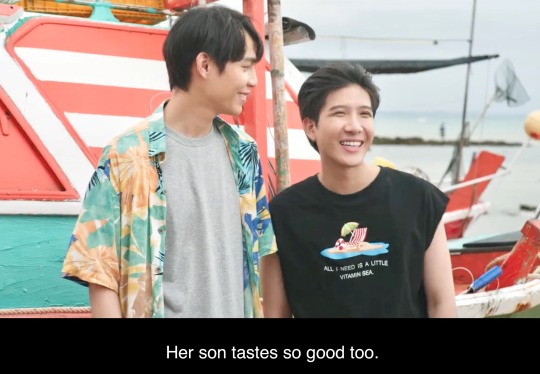
1. They are both versatile actor with good experiences on their belt and so far has chemistry every other actor they played with. it might be a bit of a waste for GMM to lock them both in a pair.
I don't think they will in the long run, I think they are just co-branding at the moment, probably because of all the sponsorship offers. And because they've been recast a few times as a pair since The Eclipse.
They seem to be having a good time with it.
I could be wrong. I picked K a while back as one of the GMMTV stable who was too versatile for them (and valuable to them because of that), and they'd never co-brand him in a big way (after the failure of Tonhon Chonlatee). Then The Eclipse happened.
But to be frank? From the actor career perspective? If they can co-brand into consistent leading roles... F & K are probubly gonna - it's better money than character work and solo or side couple gigs.
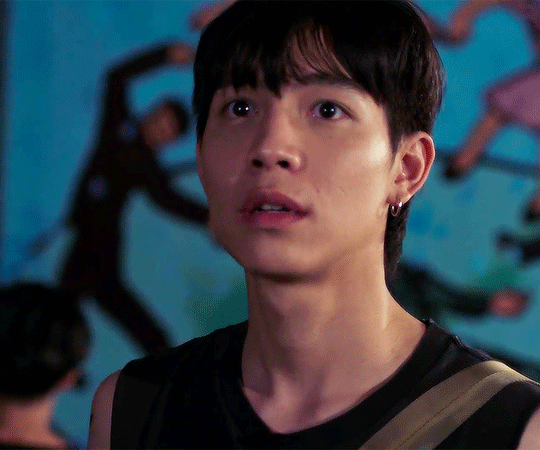
2. At the time it seems Gawin and First was more popular than FK, it should be easier and less risky to market and sail this pair, this pair also have the advantage of being in a more well known series (Not Me).
Gawin doesn't co-brand. Never has. Seems like he never will. He clearly doesn't like shipping culture or anything about it. (Doesn't like reality TV shows or variety or anything like that, either.) Which I get. Oh boy do I. I wouldn't be surprised if it's in his rider that he won't cater to performative ships. I've always suspected this is because he's half American. (And East Coast to boot.) He's... tough.... reads as a little grumpy and reserved. Won't soften his IRL image to cater to the public. It's a very individualistic attitude.
It's certainly clear he's turned down sponsorship gigs (as a co-brand), and if he took one in the future it'd have to have a dump truck of money attached. I was legitimately shocked he took on Be My Favorite.
So far as Not Me is concerned? Now it's too late, that ship has sailed. So to speak.
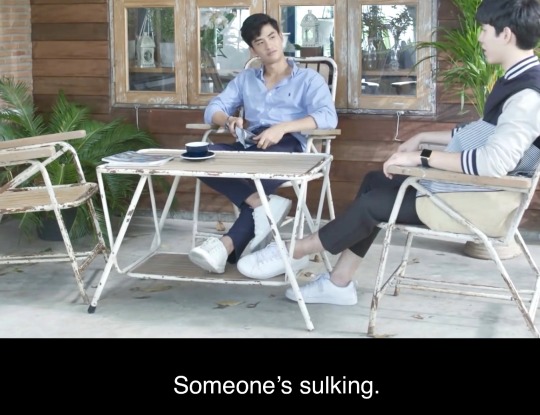
3. Both First and Khaotung relationship dynamic seems to not fit any existing mould that current BL pairs have (e.g. there's no clearly defined S/U between them), this seems risky and might not be well received by typical BL fans (esp. Thai Fans).
Yep, they are more like Nanon & Ohm. I'm actually pleased that GMMTV is letting them do this and not trying to force seme/uke on the brand.
It's a model set up somewhat by TayNew. I mean GMMTV tried to force that one, but as Tay said, "Just look at him, he's huge."
They always managed a very brotherly casual fun ship.
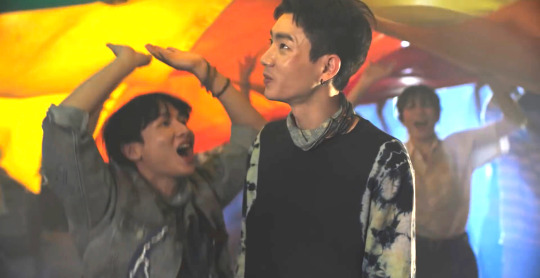
4. GMM has been trying to replicate OffGun formula a lot, all of GMM other CP seems to follow OG formula to an extent, which is not the case at all with FK.
Yes, because it's the most profitable formula. Especially in country. I would put EarthMix in as their clearest successors.
Parent houses always lack imagination.
Find a money-making formula. Repeat it until the audience gets tired or supersaturated or both. It's how market capitalization works.
To change is to impact the bottom line and that is dangerous. Generally speaking, it takes small upstart companies to truly effect change in this regard.
OffGun is an interesting case because Off was so resistant to the brand at first. He's come around, but it took a while.
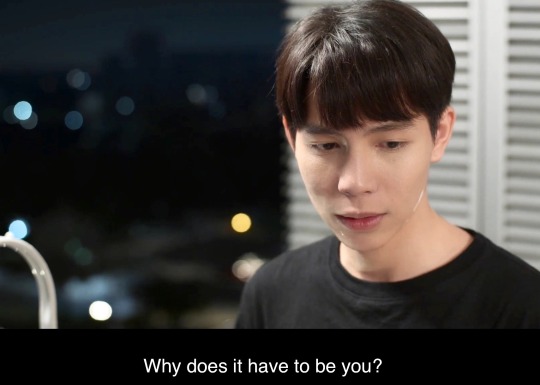
5. All of the series that both acted as a pair in (Eclipse, Moonlight Chicken, and OnlyFans), are series that i think contain mature themes and not generally something that caters to the taste of Thai BL fans.
Yes, it would be interesting to chart their sponsorship gigs. My guess is it's more global brands or those with an eye to the global market that use them.
I'm thinking it's a lot more like KARD in Kpop (performing better outside of country than in-country). Or the way Ukiss was for Japan. (An expansion intended group tailored to that market).
A country with an active and intentional soft power usually has subdivisions of effectiveness in the ranks of that power's product (in Korea's case Kpop, in Thailand's case BL). Stars that do better overseas - individuals, couples, groups. Ones that do better in specific countries.
A clever product manufacturer looking to contract with one of these branding elements, tracts this (popularity figures and market reach) and picks their representatives accordingly, and in accordance with their expansion interests.
#ABL talks about couple branding and Thai BL shipping as a market share#this industry is grasping and advantageous and kinda gross#that's the entertainment industry for ya#thai bl#firstkhao#OffGun#TayNew
68 notes
·
View notes
Quote
Our troubled relationship with time arises largely from this same effort to avoid the painful constraints of reality. And most of our strategies for becoming more productive make things worse, because they’re really just ways of furthering the avoidance. After all, it’s painful to confront how limited your time is, because it means that tough choices are inevitable and that you won’t have time for all you once dreamed you might do. It’s also painful to accept your limited control over the time you do get: maybe you simply lack the stamina or talent or other resources to perform well in all the roles you feel you should. And so, rather than face our limitations, we engage in avoidance strategies, in an effort to carry on feeling limitless. We push ourselves harder, chasing fantasies of the perfect work-life balance; or we implement time management systems that promise to make time for everything, so that tough choices won’t be required. Or we procrastinate, which is another means of maintaining the feeling of omnipotent control over life — because you needn’t risk the upsetting experience of failing at an intimidating project, obviously, if you never even start it. We fill our minds with busyness and distraction to numb ourselves emotionally. (“We labour at our daily work more ardently and thoughtlessly than is necessary to sustain our life,” wrote Nietzsche, “because to us it is even more necessary not to have leisure to stop and think. Haste is universal because everyone is in flight from himself.”) Or we plan compulsively, because the alternative is to confront how little control over the future we really have. Moreover, most of us seek a specifically individualistic kind of mastery over time — our culture’s ideal is that you alone should control your schedule, doing whatever you prefer, whenever you want — because it’s scary to confront the truth that almost everything worth doing, from marriage and parenting to business or politics, depends on cooperating with others, and therefore on exposing yourself to the emotional uncertainties of relationships.
Denying reality never works, though. It may provide some immediate relief, because it allows you to go on thinking that at some point in the future you might, at last, feel totally in control. But it can’t ever bring the sense that you’re doing enough — that you are enough — because it defines “enough” as a kind of limitless control that no human can attain. Instead, the endless struggle leads to more anxiety and a less fulfilling life. For example, the more you believe you might succeed in “fitting everything in,” the more commitments you naturally take on, and the less you feel the need to ask whether each new commitment is truly worth a portion of your time — and so your days inevitably fill with more activities you don’t especially value. The more you hurry, the more frustrating it is to encounter tasks (or toddlers) that won’t be hurried; the more compulsively you plan for the future, the more anxious you feel about any remaining uncertainties, of which there will always be plenty. And the more individual sovereignty you achieve over your time, the lonelier you get. All of this illustrates what might be termed the paradox of limitation, which runs through everything that follows: the more you try to manage your time with the goal of achieving a feeling of total control, and freedom from the inevitable constraints of being human, the more stressful, empty, and frustrating life gets. But the more you confront the facts of finitude instead—and work with them, rather than against them—the more productive, meaningful, and joyful life becomes. I don’t think the feeling of anxiety ever completely goes away; we’re even limited, apparently, in our capacity to embrace our limitations. But I’m aware of no other time management technique that’s half as effective as just facing the way things truly are.
Oliver Burkeman, Four Thousand Weeks
56 notes
·
View notes
Text

Chapter 5. Crime
What’s to stop someone from killing people?
Much violent crime can be traced back to cultural factors. Violent crime, such as murder, would probably decrease dramatically in an anarchist society because most of its causes — poverty, televised glorification of violence, prisons and police, warfare, sexism, and the normalization of individualistic and anti-social behaviors — would disappear or decrease.
The differences between two Zapotec communities illustrates that peace is a choice. The Zapotec are a sedentary agrarian indigenous nation living on land that is now claimed by the state of Mexico. One Zapotec community, La Paz, has a yearly homicide rate of 3.4/100,000. A neighboring Zapotec community has the much higher homicide rate of 18.1/100,000. What social attributes go along with the more peaceful way of life? Unlike their more violent neighbors, the La Paz Zapotec do not beat children; accordingly, children see less violence and use less violence in their play. Similarly, wife-beating is rare and not considered acceptable; women are considered equal to men, and enjoy an autonomous economic activity that is important to the life of the community so they are not dependent on men. Regarding child-rearing, the implications of this particular comparison are corroborated by at least one cross-cultural study on socialization, which found that warm, affectionate socialization techniques correlate with low levels of conflict in society.[79]
The Semai and the Norwegians were both previously mentioned as societies with low homicide rates. Until colonialism, the Semai were stateless, whereas Norway is ruled by a government. Socialization is relatively peaceful among the Semai and the Norwegians alike. The Semai use a gift economy so wealth is evenly distributed, while Norway has one of the lowest wealth gaps of any capitalist country on account of its socialistic domestic policies. A further similarity is a reliance on mediation rather than punishment, police, or prisons to solve disputes. Norway does have police and a prison system, but compared with most states there is a high reliance on conflict mediation mechanisms not unlike those that flourish in peaceful, stateless societies. Most civil disputes in Norway must be brought before mediators before they can be taken to court, and thousands of criminal cases are taken to mediators as well. In 2001, agreement was reached in 89% of the mediations.[80]
So in an anarchist society, violent crime would be less common. But when it did occur, would society be more vulnerable? After all, one might argue, even when violence is no longer a rational social response, psychopathic killers might still occasionally appear. Let it suffice to say that any society capable of overthrowing a government would hardly be at the mercy of lone psychopathic killers. And societies that do not come about from a revolution but enjoy a strong sense of community and solidarity are capable of protecting themselves as well. The Inuit, hunter-gatherers indigenous to the arctic regions of North America, provide an example of what a stateless society can do in the worst-case scenario. According to their traditions, if a person committed a murder, the community would forgive him and make him reconcile with the family of the victim. If that person commits another murder, he would be killed — usually by members of his own family group, so there would be no bad blood or cause for feud.
The state’s punitive methods for dealing with crime make things worse, not better. The restorative methods for responding to social harm that are used in many stateless societies open new possibilities for escaping the cycles of abuse, punishment, and harm that are all too familiar to many of us.
#acab#anarchism#daily posts#communism#anti capitalist#anti capitalism#late stage capitalism#anarchy#anarchists#libraries#leftism#social issues#economy#economics#climate change#anarchy works#environmentalism#environment#solarpunk#anti colonialism
9 notes
·
View notes
Text
A History of Miri (Tav)
I wanted to finally sit down and visually commit my headcanons for my Tav's background story. Much of this is told through my fanfic, Service and Worship are not Love - which POVs between Miri (afab wood elf tav) and Gale.
My Tav is a Lythari - a reclusive subrace of wood elf that are true lycanthropes, with no wereform. This is not a curse, it is considered an inherent magical feature passed on to a willing mate or to lythari children. (be aware there are conflicting opinions on some facets by resource)
The Lythari are one of the oldest races of elves on Toril, but now live predominantly in the Feywilds. Some remain in Faerun - as is the case for Miri's pack, which live in the High Forest. Miri's pack serve the Goddess Mielikki, much like a chosen might, and come to her side when she summons wolves. (I detail all of this and more in my story, so if it interests you, I encourage you to give it a read!)
I love exploring human cultures and customs, so in my writing I like to think about what might make the High Forest lythari - who would be an ancient culture living in a unique, fae-influenced environment- unique, and how to show this.
Below is an exploration of my Tav's history as a Lythari (using the character creator to generate visuals).
One way I have depicted this tradition is in hair: the lythari of Mielikki's pack communicate honor and status through their hair in elven form. A particularly skillful achievement or service to their goddess (e.g. bravery in the face of death), is symbolized by the addition of a braid into the hairstyle. The width of the plait might vary as a function of meaning/significance. Braids would be capped/decorated individualistically - with stone, or bone, or leather.
Over time, a lythari's age and skill could be observed in the changes of their hair style. As a child, a lythari would likely have few/no braids in their hair.
Here is how I imagine my Tav as an adolescent. No makeup, no age lines, pale skin as a densely-forested denizen rarely in elven shape. One thick braid as a brave, effective warrior for her age.
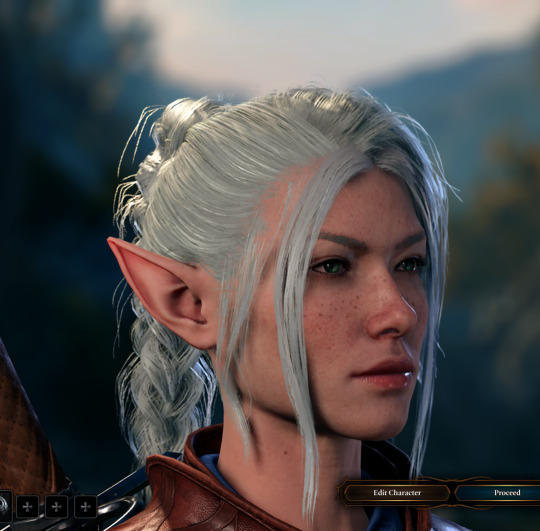
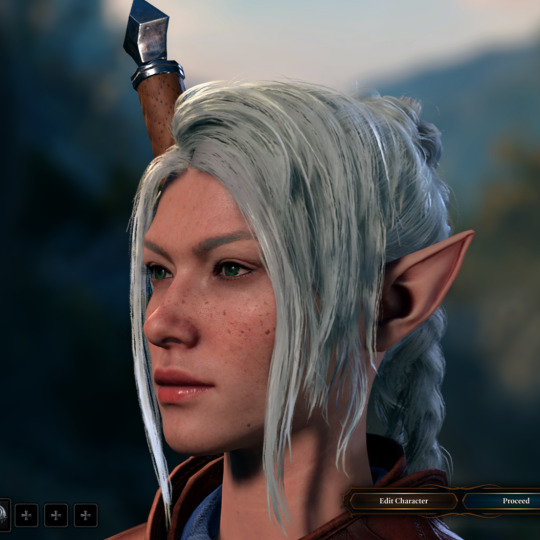
The lythari in Miri's pack are named by Mielikki - the name (in elvish) represents the skill they most possess, and what role they serve in the pack. For example, Miri was called 'Fen'Mi' - blade of the wolf (yes, it's dalish) for her speed and expertise with short swords. They earn their names from the goddess after undergoing a trial, after which they receive tattoos marking their integration into the pack.
In her 20s, Tav has started to serve Mielikki as Fen'Mi - she has her pack tattoos, grows a bit more serious, and has started accumulating braids. She is an effective warrior serving at her Goddess's side.
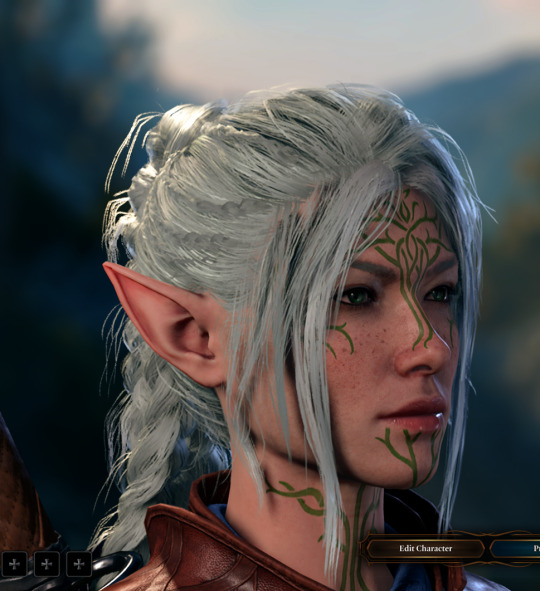

As she matures and continues to serve her pack and her goddess, Fen'Mi (Miri affectionately) would come into her power as elf and wolf. At the height of her prowess (say around her 50s) she would be decorated with many braids. Not going to give any more spoilers, but I'm sure Miri would take pride in how she decorates her braids - and no doubt she would choose her decorations in direct relevance to how a braid is earned. At this point in her life, she has developed her sense of style, wearing dark eye makeup to match the dark rim of her eyes as a wolf, and wearing more self-fashioned jewelry. She's also gotten a few scars - being the blade of a goddess is dangerous work.
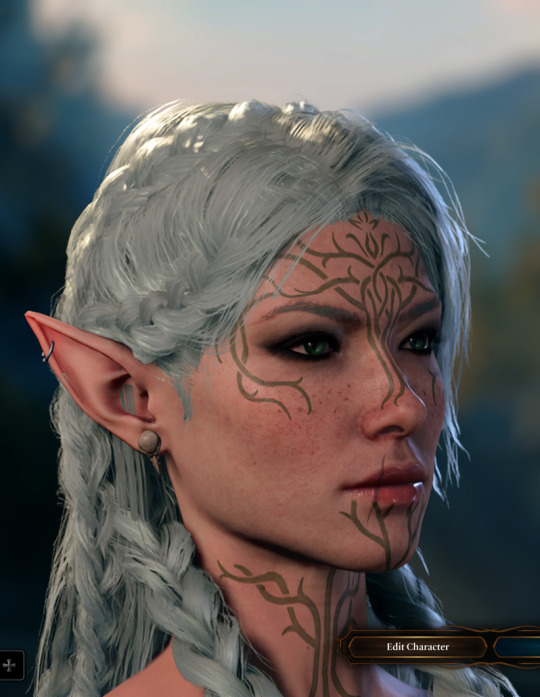
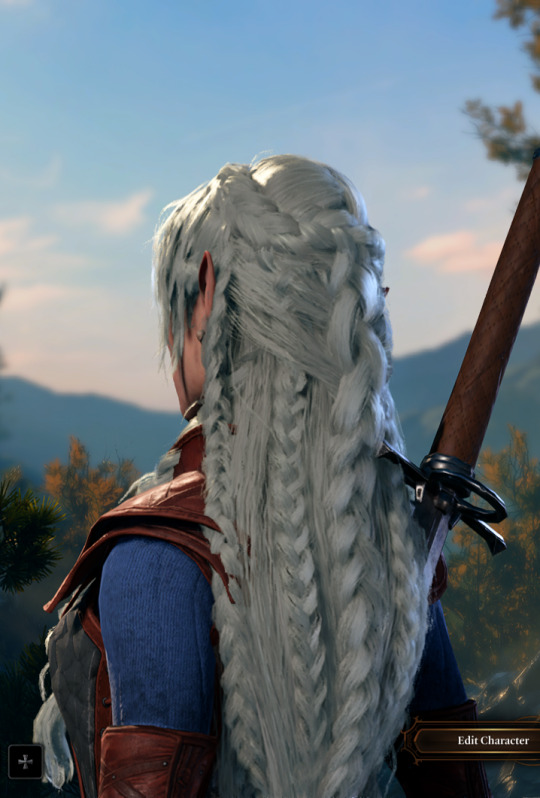
Unfortunately, that dangerous work caught up with her. Through a series of misadventures, Miri was taken captive by a drow house. They discovered she was a lythari and she was kept caged and mistreated for about 30 years while the house took advantage of her power - forcing her into bloodlust and using her as a weapon.
When she is rescued by siblings, she is unfortunately, feral. This results in an accident where Miri kills her sister. She is broken mentally and physically when she returns top-side to Mielikki. As a kinslayer, her braids are shorn away and she is expelled form the pack. She looks haggard and weak when she leaves the forest - nameless.
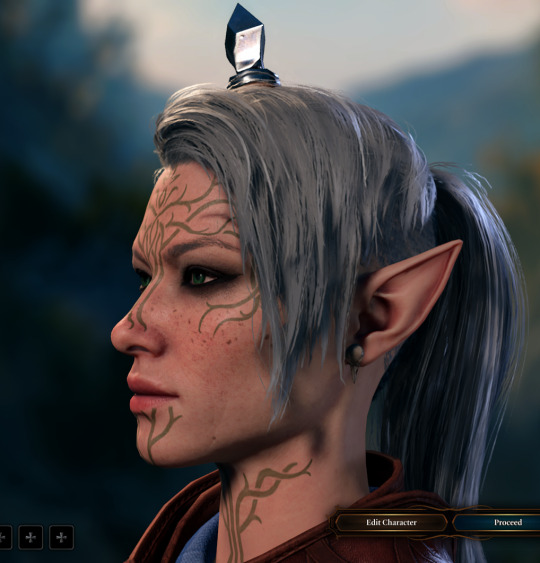
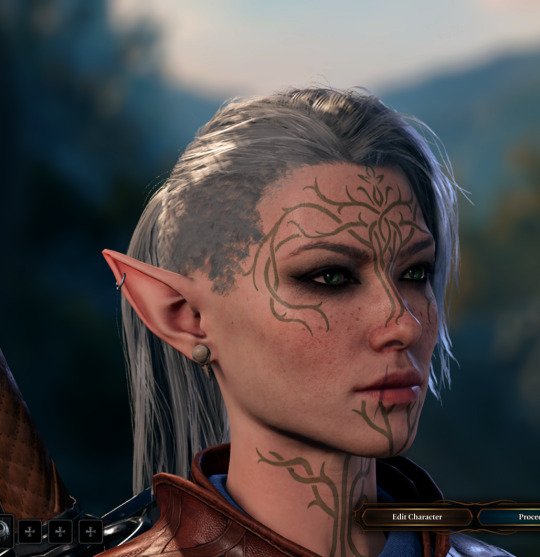
Miri, now nameless, leaves the High Forest in banishment. With no equipment, and no longer able to shift as a result of her trauma, she nearly freezes to death on the outskirts of Waterdeep. Thankfully she is found by a Song dragon of the Confluence - Talmeria.
The Confluence take her in, and she starts to learn about civilization and other humanoids. But, being a Lythari can be a valuable asset (as she learned in the underdark) - so Talmeria enchants Miri's hair to help her blend in. A few years of adventuring in elven form gives her skin some color.
Now around 90 years old, she takes on a new name - 'Tav'. (earned the classic way, a la not knowing a lick of common and being slapped with 'tavern')
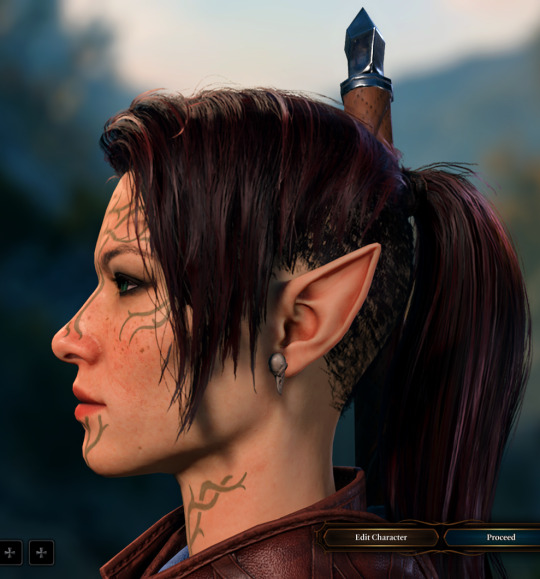

For the next 30 years, Tav wanders the sword coast, mostly in the regions around Waterdeep. She seeks redemption - and tries to fulfill herself by aiding others. She takes contracts as a ranger, aids lost souls as a pathfinder, and sometimes aids the Confluence with fighting shapeshifters (a natural enemy for a faithful of Mielikki and a Lythari).
But mostly she wants to seek redemption with her Goddess and her pack. She is raising money to take a voyage to Evermeet, where she hopes to beg her father for forgiveness. She is on the Trade Way earning coin for the boat ride out of Waterdeep when we find her in 1492 and the nautiloid scoops her up.
By Act 1, she has reclaimed some of her identity, but still does not braid her hair. She keeps the lower sections (from ear below) shaved short in self-reflection of her shame. Years on the road out of the forest and only as an elf have tanned her skin substantially, and she has developed a plethora of freckles.
(not worried about fantasy skin cancer, i guess)

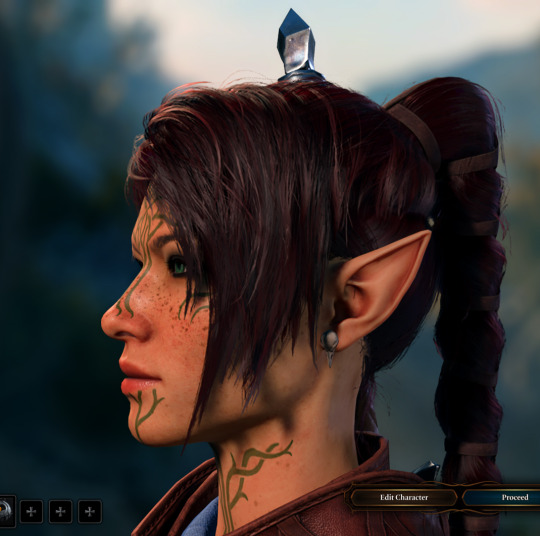
Whew, when Act 2 rolls around, Tav has really started to embrace herself again. She re-learns how to shift and accept her powers. (In no small part thanks to a particular verbose wizard).
After the events at moonrise tower, Tav starts adding braids to her hair again. She has done quite a lot of good to help others, and a lot of it has been in the face of death. (Stay tuned for some cute af fluff where she adds a braid to Gale's hair for bravery in the face of death around then too.) It doesn't take long for her to start accumulating quite a few braids.


By the start of Act 3, Tav is on her way to healing a lot of old wounds. She has fully embraced her identity as a Lythari again. And while she's still struggling through the religious trauma of being cast out of Mielikki's pack, she is learning to like herself without the direction of the gods. She and Gale are really bonkers for each other at this point.
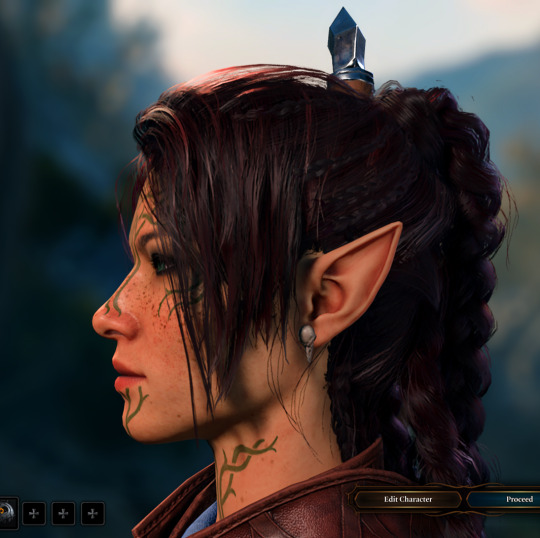
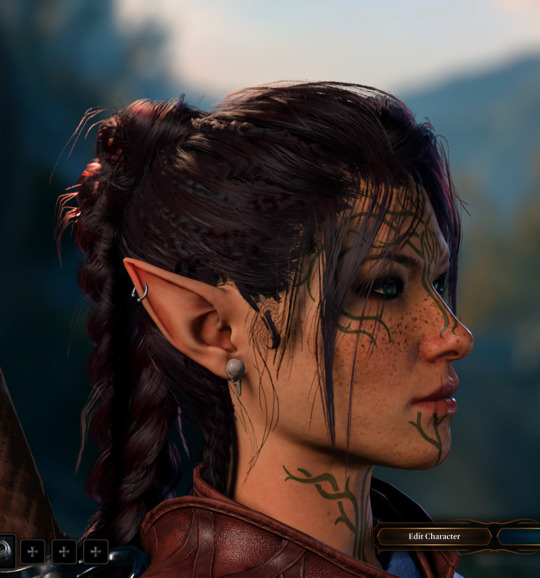
Post netherbrain, the future Mrs. Tav Dekarios is happy. She and Gale have worked through a lot of the religious trauma, and have found happiness together. She has really learned to love who she is again. And while she's still figuring out who 'Tav' should be in the wake of the tadpoles, she is enjoying herself in Waterdeep. This is how she looks at the epilogue giving bear-hugs to her pack - her found family. <3
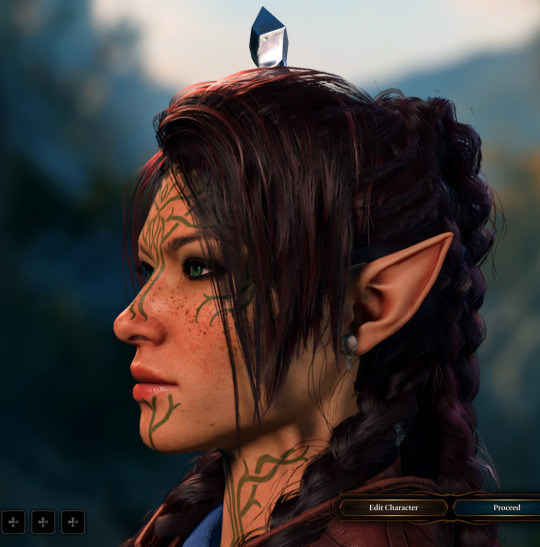

After a few years enjoying a quiet life (and only occasional work as an adventurer) inside a lot more and lupine a lot more, Tav's skin loses much of the tan. But the freckles stick around. And, one day down the line, Gale convinces her to lose the hair-color enchantment.
She is safe with him. She is safe in Waterdeep. And she doesn't need to hide from anyone. Mrs. Dekarios is happy (and so is Prof. Dekarios hehe)


Anyway thanks for reading my abbreviated history of Tav-Miri-Fen'Mi! hehe
If you love this plz check out my work on Ao3 :) (yes I am always this verbose) https://archiveofourown.org/users/dr_demi_bee

#bg3#my tav#bg3 oc#the forest familiar#service and worship are not love#just ranting about my blorbo#I love her#oc lore dump#oh shit new lore just dropped#my writing#oc: miri
4 notes
·
View notes
Text
I was going to read the next Dune book once I figured out which one it was, when I realized I still hadn't read the original. In Seven Pillars of Wisdom, Thomas Edward Shaw (né Lawrence) narrates his experiences of the Arab Revolt as a participant of the British mission to it. The testimony ranges from routine to highly implausible, but so long as you don't actually believe any of the claims he makes, it makes for an interesting read.
There are five major elements the author blends and transitions between quite seamlessly. The most common is descriptions of the geography of Arabia. As all physical descriptions, this does extremely little for me, but could be of interest to people with visual imaginations.
There is also a fair bit of reporting of both details and general principles of guerilla warfare. As with all texts about guerilla warfare, the principles are incredibly simple. Volunteer forces are even more dependent on morale than usual, the most important principle is to conserve forces, the function of guerilla warfare is ersatz strategic depth, and some way or another you should try to slowly compose a regular force in a location protected by your guerilla strategic depth because you don't want to fight a guerilla war if you don't really really have to. This can all be found in any of the major texts, while the applications and local contexts are all fiendishly complicated and non-transferable.
The author also spends a great deal of time racially characterizing the Semite, and more rarely anyone else he happens to run into. Very unpleasant stuff, but arguably useful as a reminder of just how racist people were about a hundred years ago. But while the racists certainly have gotten a lot more subtle, the substance of the arguments is entirely unchanged. As always, it is almost entirely characterizing obvious cultural adaptations and socio-economic phenomena as being instead genetically encoded, and a pathetic sense of superiority.
Sexuality occupies a fascinating amount of space. I won't try to puzzle out the author's, since he mostly doesn't see fit to share it, but I will note that he is on balance neutral towards homosexuality, and viscerally opposed to heterosexuality, and doesn't appear to consider women's sexuality at all. Mostly it seems like he hates and disdains women, and consequently considers straight sex undignified and condescending at once, like bestiality. But when he's not being a massive piece of shit, he can be quite endearingly tender about homosexuality. Or disquietingly bizarre.
Finally, the author has a mortification of the flesh and scrupulosity OCD problem the size of Jupiter. This manifests in very weird ways, and was certainly not helped by the whole attempted rape and torture thing, or the several years of deceiving his friends for several years to best subjugate them to an empire he definitely still likes but also definitely understands it is not actually nice to be subject to. Others might think the arguably pathological mentalities are the result of these experiences, but I think it's more likely part unfortunate coincidences and part self-fulfilling prophecy.
Returning to the joke from the beginning, Dune obviously does owe a lot to Seven Pillars. Some of the pathologies even rhyme - both obsessed with genetics but in Dune it shows up with a far more individualist bent, partly because it's American but mostly because it's a fantasy novel with a protagonist. Also Dune/Seven Pillars forces you to spend a lot of time trying to figure out what exactly is wrong with Frank Herbert/Thomas Shaw. Oh and the misogyny, though Herbert is terrified where Shaw is dismissive. The big difference is Herbert is a massive homophobe. 50 years of social progress, everyone!
#book report#Seven Pillars of Wisdom#T. E. Shaw#T. E. Lawrence#Dune#Frank Herbert#I've been collecting funny lines that are emblematic of these themes but they won't fit in the margin of this post sorry
5 notes
·
View notes
Note
I think mother-daughter tension is a hallmark of many first gen family dynamics! It took me many years to even begin picking apart the tangles in my relationship with my mother and I'm still working on it. Thank you for your kind offer.
I think the vibe is not just this feeling of tension in the interpersonal relationships that is familiar in your writing. It's the way love is stored in the kitchen, and how there's a lot of intention in the relationships you write. I learned about stories through east asian media when I was a teenager and sometimes pick up on others who did too. For those people, longing even between people who are already close seems to be a common thread. Those media are also clearly deal with situations where duty and obligation must be dealt with before directly addressing interpersonal relationships, because outside situations affect those relationships.
I don't know if you also grew up stateside, but if you grow up in an individualistic cultures, that clash between parents and close family of older generations telling us to put obligations first and society saying to take care of what you want and need first and foremost (including parts of relationships) seems to emerge in a certain way among writers.
I have only read the Burden of Being and a few of your specials, but I felt that balance in Burden of Being especially. It had already been a hard week, but reading that sincerely made me tear up more than once because the main character's way of dealing with stress was and grief was so familiar. It was incredibly cathartic to see her emerge from that with the knowledge of her own resilience but also to have the chance at love returning.
Although it may not exactly explain the vibe, there was certainly something about it....
(sorry this is so long, but I love that piece and appreciated your reply. If you have any book recommendations I would love some!)
you clocked me so well. like i’m getting heebie jeebies (pos) bc i kinda feel naked rn lol. just bc i’m baffled you were able to get that from a couple of things i’ve written. hope you don’t mind me contributing more length with some of my thoughts
the collectivist and individualist clashing ideals is so true! one of the reasons why i love reading books by asian authors and specifically, asian immigrant authors is because of that conflict of identity. to be borne from a love that’s usually in tandem with guilt, obligation, and suffering but a desire for a sense of self is so conflicting on its own.
and i feel like you find that most in asian mother-daughter relationships. being a woman by itself requires sacrifice just by societal definition alone. and for asian women, a daughter is a mirror to their younger self, the idealized vision who can pursue all a mother’s dreamed of without the sacrifices she had to make.
and for you to find familiarity in the main character of the burden of being simply swells my heart. that fic was untouched for a very long time and part of that reason was because i didn’t know how to tackle her journey through grief. a lot of fics that i admire are able to send messages of growth and healing through therapy and i wanted to do that too. but it felt like a lie bc in my personal experience, it is not that easy to seek help in healthier ways.
i was afraid that by being honest, by showing this reader go through relapse after relapse and drink her troubles away, i’d be sending the wrong message and promoting poor habits. but i’m glad i did and that by finally telling a truth that i see often, i was able to finish the fic. and it makes me think i made the right choice when people tell me they were able to relate to it! learning lesson indeed on that one.
i forgot my password to my goodreads account so my recs list might be basic because i’m pulling them off the top of my head but!
Pachinko by Min Jin Lee literally changed my life and i always recommend it. It explores family dynamics across generations.
Crying in H Mart, On Earth We’re Briefly Gorgeous, and The Joy Luck Club are obvious contenders.
Speak, Okinawa by Elizabeth Miki Brina is an autobiography. It’s the author’s first published book I think so while I do find flaws like the lack of complexity in her storytelling/sentence structure, I found it still enjoyable to read.
The Girl With Seven Names: A North Korea Defector’s Story is an autobio that read more like a thriller with complex mother-daughter relationships.
#reina.receives#and here in the tags comes the gratitude#thank you first of all for reading the burden of being! like… i cannot express how much that means to me#and literally for going in depth and explaining to me what you’ve noticed in my writing :(#i feel like i’ve just bared my heart out to an attentive stranger at a bar#like thank you for making me feel heard#oh! i hope your weeks have been better than before
5 notes
·
View notes
Text
Another post on Moon signs you can drag me for
Before we get into the actual thing, I'd like to say this post initially started as something else but ultimately, what I tried to put across is, sometimes Moon signs aren’t that easy to decipher. It’s easy to grasp overall characteristics of the signs and then learn how to identify their specific traits. But what people seem to forget it that Moon represents the deepest side of us & our inner world - it’s uncommon to really see someone’s side of it unless you really pay attention. Sometimes I’m surprised to see what someone’s Moon sign is even if I know this person well. Meaning, people usually hide that part of them - or they just simply process it internally and others can’t see their emotional reactions. It’s also uncommon for folks these days to fully express their emotional needs so it gets even trickier to pin-point their Moon characteristics.
I don't think I have to mention this but, of course, your entire chart should be taken into account, as well as house placement, aspects. Personally, I like to also look at Moon's dispositor.
Let’s start from my friends, Gemini Moons, who, I feel, get a bad rep for not showing their feelings and scanning every emotion like an AI. Nah-ah. I know this one Gemini Moon whose immediate emotional reactions aren’t very cerebral in the sense of processing everything in the mind and intellectualizing it aka, what people like to label as being un-emotional. Instead her reactions are often fast (air energy) but physically expressed through Mercury (Gemini Moon’s dispositor) and Sun (overall identity) – she has them both in Aries. She’s a crybaby who can burst into tears in a matter of seconds. So she’s not something that would stereotypically be assigned to a Gemini Moon. But what I did notice is that all Gemini Moons tend to have this weird look on their face when they’re processing stuff. As if they were about to have a brain malfunction; they stop and have that specific worried look. They also like to either gossip or tell stories (either real or made up lol); they’re great with words - they can talk for hours if they feel comfortable with you. They just crave interaction and mental stimulation. Their quick reactions tend to make them effortlessly witty. Even if they’re a withdrawn Gemini type, they make up for it through social media and technology or just a quiet exploration. My shy Cancer pal with Moon in Gemini is now a brand/website designer and an instagram queen who travels the world. This is great energy for content creators in general. And don’t forget that Geminis need to have their fingers in many pies. It’s because they always have a backup plan… and they get bored easily so they need that chaos around them to feel at home. They like to have options in everything, which is kind of funny cause it’s hard for them to make up their minds and actually choose something. And they store a lot of information in their brains… I feel like it must be exhausting, no?
On the other side of the axis, whenever I see someone with a Sagittarius Moon, I can immediately say “yup, a Sag Moon indeed” (probably thanks to my Sag stellium), meaning, they all seem the same to me. Sag Moons often find comfort in exploration - best if it’s literal travel. They always seem to need to free themselves from their surroundings, family, roots or their own culture to discover something new and exciting, even if it’s only in the imaginary words - through books, movies and other medias. Their happiness always lies somewhere else from where they currently are. Like, I think all Sagittarius Moons that I know have left their parents and went their own paths early on. And they have this yolo attitude. Just like Sagittarius Suns, they’re massive dorks, probably also obnoxious… sometimes in a REALLY annoying way. They’re either a) very wise and curious b) lil preachy and stuck up c) just plain dumb clowns with no filter. But they’re all funny. And they take things lightly, with a natural ease. This means sometimes they may offend other people just because they assume everyone’s as chill as they are; „relax! I was just kidding!” - that’s a phrase you’ll hear from them often… I mean, unless you’re a jokester yourself and you’re unmoved by their sarcastic or teasing words. They have somewhat spiritual or philosophical nature so besides making you laugh, be prepared for deep monologues. They want to believe everything will eventually fall into place. It’s also hard to bring them down - or I should say, it’s hard to make them acknowledge that they're feeling down - they always try to distract or cover it up with a joke, usually a self-depricating one. If Sagittarius Moon (or Sagittarius in general tbh) is telling you that they’re unhappy, then it’s serious.
I’ve noticed there comes a point in life for a Libra Moon where they just have enough. They’re too nice for everyone and one day they wake up and yell about how they have to do everything for everyone and everyone wants something from them and bLah bLah. Makes me think of when Bieber was this overly nice kid and then he was like “I’M NOT TAKING PICTURES WITH FANS ANYMOREEEE AAGhJFJFUWIUq”. Yup, a Libra Moon, everyone. They know how to charm and appeal to people, I think overall they’re easily liked by others. Sometimes it’s simply because they like to kiss people’s ass just to avoid being rejected. That’d be a Libra Moon’s nightmare. They like other people’s company too much. And they thrive in relationships and in a big circle of friends. What they hate is confrontations (like every other Libra placement omg). They may be good mediators when it comes to other people but if they’re involved in an argument they get sooooo passive aggressive. They just don’t know how to handle conflicts - it’s as if their nervous system wasn’t designed for emotional outbursts (because, you know, everything needs to be peaceful and harmonious Venus-style). A fussy or angry Libra Moon will suddenly get loud as they blame someone for something… and then they’ll leave the room cause they’re scared to even hear the other side of the argument. Or, alternatively, they’ll make a doormat out of themselves just to stay quiet and avoid causing any rift. And making decisions? I think it’s common for them to have two different romantic interests and feeling so dramatically torned between them *Alexa play Agony from Into the Woods*. Then when they decide, they have problems breaking the bad news to one of them.
On the other end we have Aries Moons. *deep breath* Listen, I think I’ve said enough about having Moon in Aries (or rather purely dissing it) but last time it made a bit of controversy so why not wreak even more havoc. I have a good description for this one: I will punch you but be gentle with me cause it’s easy to break my fragile heart. So basically, imagine putting Buttercup and Bubbles into one person. And honestly, I need to say this, women with this placement are just hot badasses, look at friggin Angelina Jolie. The queen of badass. The queen of hot. People say because Aries folks move quickly (literally and figuratively lol), they often get bored with whatever got them excited last week... or yesterday. Ha, yeah, right. You get their heart to open up and they’re going to have their eyes for you ONLY, like a lil puppy. Give us treats and we’ll build our world around you. But NOT in a clingy way by any means, we need our space and independence after all. My lil niece is an Aries Moon and ever since I started playing guitar with her, she became my #1 fan or something. That’s the energy. But we get easily bored with day-to-day stuff so yeah, there’s that. Innocent and clumsy yet raw in their emotions - so there’s potential to make mistakes sometimes (or a lot of times) or having this tunnel vision, like „I want this and I don’t care about anything else!”. And then excusing it with some „but the heart wants what it wants” crap (looking @ ya, Selena Gomez). They experience constant inner movement and turbulence that needs a physical outlet in order to feel satisfied. WE NEED PASSION IN OUR LIVES, OKAY?!?!?? now leave me alone
Aquarius Moons aren’t as cold as you might think. People like to describe them as if their Moons actually disappeared from their charts: dEtaCheD, uNeMotiOnaL, tHey fEeL nOtHinG. It’s just they don’t sit and dwell on things, they find solutions to the problems. If something doesn’t make them feel right, they just leave that situation. They do care about other people’s well-being, they’re very sensitive in that regard, they’re humanitarians after all. Yeah, they detach, but from their own emotions - in order to make sense of them. They may seem like snow queens sometimes (and this comes from an Aqua rising) but they’re really friendly and if you pique Aqua Moon’s interest, they’re going to be curious about you. They like new exciting things so if you’re cool enough, you have their attention. Usually they’re pretty progressive as well and can’t stand injustice. That’s why you’ll see them standing up for those who are in need. Uranian energy gives them a specific type of sharp intuition and wit. Idk they’re just cute in a quirky way. But this buzzing, fast energy is a great recipe for anxiety, over-thinking and frequent changes of heart. Similarly to Sadges, they need constant exploration and stimuli. Intelligent, people-oriented (but not people-pleasing! Look to Libras for that), individualistic. They definitely need their own space and independence. Their decision-making is fast and it’s easy for them to just say „screw it, I’m doing this”. My Aquarius Moon friend just casually decided that she’s moving to Turkey cause nothing in our city (or even country) seems interesting or helping her expand… So she was like, see ya suckers, I’m leaving.
Leo Moons shine from within. You’ll spot them from a mile away even if they’re on the shyer side. They’re all lil stars no matter their profession. Very expressive people & easily excitable. Art galleries, live shows, theater - they love a creative environment even if they don’t pursue that lifestyle themselves... One of my Leo Moon friends is an art junkie – suggest taking her to an obscure play at the local bar, a music festival, a weird museum – she’ll say yes in the blink of an eye. And she loves discussing these things. A Leo Moon may not see themselves as artistically inclined, but usually sooner or later they at least try dipping their toes in music, arts, acting, dancing... you name it. They’ll learn a simple 3-chord song on a ukulele and then play it to you in excitement. Imagine a lil kid making you a puff piece and being super proud of it. Sometimes they just need some encouragement. Remember, Leos feed off of praise, that’s their fuel. Doesn’t mean they’re all proud, egotistical people but what it does mean is that they need a lil assurance to gain their self-confidence. I lived with a Leo Sun/Moon for almost 15 years (who’s a musician btw so yeah, a classic creative Leo type) - he did have some issues lol but ego wasn’t one of them. Drama followed him everywhere but I’m pretty sure he disliked it himself. BUT, with that being said, I feel like Leo Moons tend to dramatize themselves internally. People say it’s something Virgos or Geminis would do - because of their tendency to overthink, but Leos can just go straight to a worst-case scenario in their heads simply because they exaggerate everything. So don’t be surprised to see a Leo Moon feeling down and anxious. On the bright side, be their cheerleader and they’ll give that to you in return. They need sparks and dullness kills their upbeat spirit. They need to feel their own heartbeat so the feeling of excitement is crucial for their well-being. Romantic, giving and kind. They’re fixed fire so once they’re set on something or someone, they give their all and are rather loyal.
I feel like my chart low-key tells me I should dislike Taurus Moons but I just want to melt in their arms and just stay there? Like, forever? Low maintenance but a bit slow-moving and stubborn. They won’t settle easily, at least not officially, so you need to have a lot of patience with them. They need 3 things to feel secure and at peace: physical stimuli, time and a stable place they know they can always come back to. And it’s not like all of them are total lazy homebodies, they may be active spirits & travellers but they are going to have a reallyyyyy nice cosy flat somewhere near their childhood place (gotta be be close to their moms, you know). Not necessary materialistic but they may have one thing that they collect throughout their entire life and they won’t. ever. get. rid. of. it. There needs to be at least one constant in their life - like you know when Elton John decided to go to therapy but one thing he stuck to was shopaholism? Very Taurus Moon of him. Also, they’re very affectionate. In fact, may have issues differentiating between affection and passion - this is actually something Taurus Moon and Aries Moon have in common. Pro tip - and this is in regard to all Taurus placements - don’t smell bad when you’re around them (I mean, don't smell bad in general, no one likes stinky people lol). They have a sensitive smell. Doesn’t help that they like to smell everything. EVERYTHING. I swear, Taurus, stop sticking your nose in every single thing!!! You don't need to know how that piece of utensil smells like. Jeez.
Scorpio Moon (shoutout to those who remember me accidentally calling them sporpio last time I made a post on Moons lol). I honestly don’t know what to tell you... I feel like all you hear about Scorpio Moon is 100% true, there’s nothing to debunk here. It’s the Moon of extremes. Prone to jealousy and surpressing emotions; severe trust issues; they’re instigators. I was low-key bullied by a few Scorpio Moons when I was in school so there’s that. Very secretive and private. Scorpio Moon will be like “I’m in control of the situation!!!!” and you’ll just look at them and think, yeah, right, looks like the situation is controlling you. But keep being in denial, sure. Like, don’t get me wrong, Scorpios in general can be TOTAL SWEETHEARTS OMG but ya’ll have issues. Even celebrities who have this placements... Think Beyonce or Lady Gaga, Miley Cyrus... I feel like they have issues lol, especially with control and the need for everything to be perfectly the way they want it to be. To be fair, that’s probably why they’re all so influential and high status: it’s either their way or highway. They need constant reinvention; they’re the ones to wake up one day and decide they’re going through a spiritual awakening blah blah. They also like to talk about dark and shocking topics while having casual lunch with you... So like, be warned that you may end up with a depressed mood after talking to them for 10 minutes. And their mood swings... don’t even get me started on that.
I don't know where to start with Virgo Moons... I feel like they're very calculated and nit-picky but they're a lot warmer than Virgo Suns. I think I called them softies in my last Moon post. Very sweet people but prone to anxiety. You gotta experience seeing them having a heart attack over someone mixing bananas with milk or messing with their stuff that’s been put in a perfect arrangement. I saw a Virgo Moon once literally squealing shouting "YOU'RE GONNA RUIN YOUR LAPTOP WITH THAT SUPERGLUE!!!" Highly entertaining to watch, not gonna lie. Gordon Ramsay has his Moon in Virgo - it’s conjunct Uranus and Pluto so that’s an extreme but I think him being fed up with people over small inconsistencies in their food prep is a perfect example of this energy (btw his chart is hilarious, it literally explains EVERYTHING). They're VERY picky with their food as well, just as Virgo Suns tend to be. Like, they’ll only have a specific type of single origin coffee or they’ll be vegan or something. Self-critical over their work, which is a plus... except for when finishing a simple task takes them a few hours because they want to make it perfect. They take everything seriously. This of course doesn't mean they're total bores - on the contrary, Mercurial energy gives them witty approach and a talent for choosing the right words at the right time. Tho they can be a bit awkward or shy with it. Can be as bubbly as Gemini but the grounded earthy energy gives them more practical and almost nurturing nature - earth signs are providers after all and Virgo is the sign of service - helping others is like their second nature. I’ve noticed they often find comfort in devoting themselves to a choosen task - this is why if they pursue something, they’re really good at it. They’re also very likely to dissect their emotions.
I’m not a fan of water Moons in general but Pisces Moon is the best water Moon in my opinion. Maybe because I like Pisces overall. I think it’s like a tweaked Sagittarius Moon - just more internalized, withdrawn & gloomy. But unlike Sag, who has a tendency to be an adventurous optimist, Pisces likes to focus on the negatives instead. Obviously, they can be very upbeat, they’re Jupiter-ruled after all, but there’s somehing whiny about them lol. Just like Sadges, they dream big and have their standards put up sooo high but if there's not much active energy in their charts, they’re often too passive to actually fullfill any of that - or I should say, they’re stuck daydreaming about it, believing it’ll just magically manifest for them... OR they do everything with an apathetic approach. What I do like about them is that they’re funny. And really chill - sometimes to the point of coming off as confused or hazy. I feel like a lot of them would just love to sleep all day... or sit by the lake and just think about the world. Most of them are also compassionate folks - again, maybe a bit too much. Hey Pisces, you don’t have to take everything to heart, it’s okay. On the bright side, they have big imagination and the ability to disconnect and just create. I have a few Pisces Moons in the family: one’s that sleepy artistic type with grand visions, one is an asshole-ish but funny entrepreneur with a questionable work ethic and one is a witty IT guy who’s actually a workaholic and likes to shut in his own world of computers and numbers or whatever he does there... So there’s this factor of tunnel vision, escapism and, on the more negative side, being kinda iffy and almost addicted to the way they want things to be. Once they set their eyes on something it’s done deal…
My issue with Capricorn Moons is that they're often trying to be sooooo mature omg, like, loosen up a bit. It usually starts when they're in their later teens... They can be the most rebellious kid that likes to have fun and suddenly they'll be like "I'm too old for this ugh grow up" *judgmental stare*. My 18-year old niece once literally roasted my sister that she's in her 30s and still doesn't have her own place (well so do I so I guess she also indirectly roasted me as well???). And she was SO deadpan with it. Because she herself wants to be independent and start a family before turning 25. This is classic Capricorn Moon energy. They suck out joy out of everything lol. Of course, OF COURSE, it depends on the whole chart but I feel like worst-case scenario is that at one point in their life (or maybe even a few times throughout it) they go through a massive shake-up that makes them change their attitude and re-evaluate their structures. There's this multi-instrumentalist Yvette Young - she's a sweet, funny Cancer/Leo mix but her Moon is in Capricorn. She used to be a competitive pianist but the pressure that was put on her has led her to severe health issues. Like yes, she’s now an extremely talented musician - thanks to family’s expectations & a rigid schooling system (Saturn) but it did cost her a lot. She has recovered since then but I think it's a perfect example of this energy. It’s very ambitious and hardworking but emotionally demanding in the sense that you have to actually put your emotions aside in order to deal with the rest. Another thing, because Moon can be associated with family, there's often a weird dynamic surrounding this topic. I don't think I've met a Capricorn Moon that had a completely healthy and happy relationship with their fam or one of the family members. Or, alternatively, there can be a strong bond between one of them but usually created in the atmosphere of hardships.
Last but not least, Cancer Moons. I had three school friends with this placement and all of them made this sad, whiny face as they said „oh I don’t knoooow anymoreee” when they were feeling torned or frustrated. To be fair, two of them are water Suns so for them, it added to the mushyness. All Cancer Moons I know are family people or better yet, baby people. One of those school friends is now a guidance counsellor, working with kids; the other turned her instagram into a gallery of her own child after she gave birth. So much kid content, omg. There’s also something very indecisive about them… or I should say, hesitant. They’re not very fast at making decisions. Also, what’s interesting, they’re kind of like walking libraries, they remember a lot – so they store a lot of information in their brains just like air signs but they process it in a completely different way – emotional, obviously. I think this also makes them hold grudges a lot. For them it’s more of a question of „how does it make me feel?” rather than „how valid is it?”. There’s certain stubborness in them in that regard because they don’t keep their minds open. It’s also hard for them to walk away from people and situations, like a crab pinching you with its claws – it won’t let go. Sensitive but not easy to open up; very protective of themselves and their loved ones & they tend to shut down in their crab shells. But they may crave connection and the feeling of belonging. Also very caring and with a big imagination. They’re very receptive of their environment so mood swings are a thing for them.
#IT'S HEREEE#i think i edited this post a million times#i kept changing and adding stuff#but i did it#astrology#moon signs#moon#aries moon#taurus moon#gemini moon#cancer moon#leo moon#virgo moon#libra moon#scorpio moon#sagittarius moon#capricorn moon#aquarius moon#pisces moon#mercurytrinemoon
1K notes
·
View notes
Text
The good thing abt Steve and smth ppl are missing in the current discourse is he really did say Fuck America literally every chance he got and criticized the US govt every second he wore the suit and the govt absolutely hated him for it.
Even in the 40s he didnt want to kill anyone "for America", but as a disabled man couldn't fathom not standing up to the eugenicist Nazis. He wasn't politically motivated by nationalism but instead by human compassion. In fact, it is extremely likely he was highly critical of the US govt as a young man preserum given his impoverished life circumstances and constantly failing health. Living in NYC, seeing the shanty towns in Central Park, unable to afford life-saving medicine, watching Bucky and his mother kill themselves to make a nickle, surrounded by the radical leftist art scene in NY as an art student - Steve saw and lived injustice every day. And empathized with people who suffered different social misfortunes than he did (the woman crying in the movie theatre, "I don't like bullies", Peggy suffering sexism) although his personal list was extensive itself.
To him, the shield was always more of a philosophy and never attached to a specific country, which is what made it so easy for him to blow off 117 countries for Bucky, or tear the star from his chest yet defend the world in the vestiges of his armor against Thanos - he was fighting for what was right and not what was dictated by any country or political ideology (which is the main issue in Civil War with him being against the Accords, and one he was extremely well-positioned to understand having been used as a symbol and propaganda against his will many times, and having witnessed the dangers of state-sanctioned violence in WWII and CATWS. Even if Steve's argument was also faulty to an extent, you can absolutely see why he would argue for that perspective).
Steve was as FDR leftist artist in the Great Depression post Crash 1930s, disabled and chronically ill, diminutive and likely targeted by US eugenicits in NYC who vocally campaigned against disabled people being alive in the 30s (saying they should be sterilized or killed), son of an Irish immigrant single mother, lived in historically queer neighborhood of Brooklyn, an artist, and in the MCU coded as bi. He fights for whoever needs him, not for whoever tells him to. He was always highly critical and tongue-in-cheek/tired of the costume, drawing himself as the dancing monkey in CATFA ("Ready to follow 'Captain America' into the jaws of death?" he confides his mockery in Bucky, who heartwarmingly assures him that no, he is following Steve.) Steve continued to question, dog, and make trouble for the US continually after that until he wholeheartedly said Fuck You in CATWS and just dropped the shield (and never picked it up again until he handed it off to Sam, who he was confident could do something meaningful with it that he was not positioned to as a white man).
Steve visibly appears as a bygone era's "perfect man" and outright REJECTS both this supremacist definition and the shield's gatekeeping/the shield itself. Sam visibly appears as an "outsider" to exclusivist and systemically racist systems and yet EMBRACES the shield's potential. They are both radically standing up for the same cause in different ways and this comparison depicts why they are so closely aligned and best friends.
The irony of Steve Rogers as Captain America is hugely important to his character. In many ways, Steve is depicted as a reluctant hero who struggles with the strength of his own moral ideals versus the highly imperfect symbol he dons. This is different from other superheroes who usually self-create their alter egos as symbols of their more perfect, empowered selves.
In contrast, it is Steve's natural hardiness, independence, and righteous outrage in the face of wrongdoing which represents America's best ideals, but distinctly is opposed to its government which directs that he act as its image. As Steve holds the shield we see the image of a person who is critical of the govt for falling short of its principles and simultaneously embodies the ideal qualities that a equitable and free US is supposed to hold. Importantly, and definitively for his character, Steve as Cap shows how wanting the US really is for the goodness it robotically claims to have. And that is why he is important and impactful as Cap, essentially because he is uncomfortable with and critical of the costume.
The status of the suit often does not coincide with his personal beliefs. Yet he wears it to attempt to level up the system he is, for a while, mired in. Steve is not a patriot, not in the common sense of the world, he is instead a patriot of the humanist cause. This puts him on-site for many enemies, including those domestic to him and thus defines him as a hero.
Though his physical appearance suggests that he might wear the suit with a blind nationalist fervor a la John Walker (depicted as a perfect automaton soldier), Steve could not be further from that mindset (a good individualist man). As a now "perfect specimen" poised to be accepted and revered, Steve has the ability to choose an easy life where he is free of the hardships and ostracization he endured preserum. Yet instead, post CACW, Steve chose to continue to stand on the side of progress, the "little guy", to abandon the shield and now finally proudly embrace his pariah status and fight for those pushed aside or deemed unsalvagable or scapegoated (symbolized by Bucky) as he recognizes that while America's rule may benefit some, it still causes other to suffer and struggle (as he once did).
Not to mention, as a meta point, he was crafted as the "perfect man" from a sick, disenfranchised disabled boy who absolutely loathed Nazis by Jewish comic artists to mock the Nazi Aryan ideal - inverting their eugenicist visual image of perfection by empowering someone Nazis would view as worthless to burn their entire evil regime to ash.
He still, today, stands staunchly at odds with far right extremists and fascists in the US today and worldwide. He's the furthest thing from them and he'd have no problem in showing it. Choosing Sam as his successor, proudly, confidently, lovingly, and as a brother in arms who steps back so others can speak for themselves and tell their own stories, Steve shows his cultural and political understanding and his good heart once again - this time as an ally, friend, and a champion of the heroics of others.
225 notes
·
View notes
Text
Choosing the right pagan path for you

Finding a religion is kind of like dating — you need to really know yourself before you can know what you need from a religion (or a romantic partner). And, like with dating, there’s a lot of weird stigmas and social expectations around religion. A lot of people want to settle down with the first one they kind of vibe with instead of taking the time to see what’s really out there. But if you really want to be happy in the long term, you’ll need to have a little patience and be willing to do some exploration.
Getting to know yourself is crucial to a healthy spiritual life, no matter what your religious or spiritual beliefs are. Get comfortable with who you are and what your spiritual needs are, then start looking for a system that meets those needs.
Need a place to start? Try interviewing yourself! Here are some questions you may want to include in your self-interview (make sure to write them down!):
What, if anything, do you absolutely know, beyond a shadow of doubt, is true? What, if anything, do you absolutely know, beyond a shadow of doubt, is not true? Do you believe in absolute good and evil? Do you believe in, or are you open to believing in, reincarnation? What about the existence of the soul? What about an afterlife? Do you believe in fate? What about karma or a similar concept? Do you believe that everyone and everything is connected, or are you more of an individualist?
It’s also helpful to go ahead and figure out where you stand on certain religious concepts that are common in paganism. For example, are you a monist, a soft polytheist, a hard polytheist, or a pantheist? Do you feel you’d do better with a neopagan system, a reconstructionist system, or a revivalist system?
Answering these questions will help you start to identify what your core beliefs are and what you need from a religious system. Keep your answers handy. As we explore different pagan religions in future posts, compare their theology and philosophy to your answers. This will help you determine whether any given system is a good fit for you and your existing beliefs.
Remember, most pagan faiths are not exclusionist — they acknowledge the value and truth of other religions. Choosing a pagan path isn’t about finding the One True Religion. It’s about finding the best religion for you.
You’re unlikely to find a system that you agree with 100% right off the bat, but you should agree with enough core theology that you aren’t uncomfortable. I firmly believe that religion should challenge us and help us to grow, but it definitely shouldn’t be triggering or upsetting. You want to find that sweet spot where you’re comfortable but still have room for growth.
They say that when choosing a romantic partner, you should look for someone you agree with 90-95% of the time. This similarity in belief and opinion gives you a solid foundation to build on, but the 5-10% disagreement keeps your relationship from becoming an echo chamber. I think this is also an excellent rule to follow when choosing a religion.
Once you’ve taken stock of your own beliefs, it’s time to consider your interests. Is there a certain system you feel drawn to? If so, that would be an excellent place to start your research!
For example, maybe you were obsessed with Greek mythology as a kid — if so, you may want to start by investigating Hellenismos, the worship of the ancient Greek gods. Maybe you grew up Catholic and always felt a close connection to Mother Mary — you may want to investigate Goddess worship. Or maybe you’ve always resonated deeply with the figure of the witch in fiction and folklore — you may want to investigate Wicca. Starting with a system you already have an interest in will keep your research fun and exciting.
You may or may not choose to consider your cultural heritage when choosing a starting point for your study of paganism. If you feel closely tied to the culture of your ancestors, you might start by learning about the gods they originally worshiped.
Let me make one thing clear: the gods do not care about genetics. If you feel drawn to the Norse gods, for example, it does not matter if you have Scandinavian heritage or even European heritage. What matters is whether you’re willing to uphold the values and practices of Norse paganism. Don’t let a lack of an ancestral link keep you from pursuing a religion that interests you!
(Of course, ethnic religions do exist, and some of these systems are closed to outsiders. Judaism and Voodoo are good examples of this. However, all of the systems I’ve mentioned in this post, and all of the ones I’ll be covering in this series, are open to anyone regardless of their ethnicity.)
You may not feel connected to your cultural heritage at all, and you may not even consider it as you explore paganism. That’s fine! Just know that it does offer another possible entry point into the big, wide, diverse world of pagan religion.
You should also consider whether any pagan religions are more readily accessible to you than others. Do you have a friend who is already a practicing pagan and would be willing to take you under their wing? Do you live in a country where certain deities used to be worshiped and have access to historic sacred sites? Are there local pagan groups in your community? Consider these resources when deciding where to start your research. The good news is that, with the Internet, you’ll have access to any system you feel attracted to, at least online.
One of the most common accessibility issues pagans run into is a language barrier. This is especially true for reconstructionists and revivalists. Unless you speak fluent Irish, you’ll probably have to rely on English translations for your research of Irish mythology, for example.
Finding quality translations is essential. A translation error can sometimes change the entire meaning of a poem or myth! The best way to find good translations is to ask other pagans. Don’t be afraid to ask someone more experienced for book recommendations!
Once you’ve chosen a starting point for your research, the next step is to start reading! (Still not sure where to start? Don’t worry! In the next several posts in this series, I’ll introduce you to some of the most popular pagan paths and provide resources for more in-depth study.)
Choose your sources carefully. I try to read an even mix of academic sources (which tend to be less biased) and sources from pagan authors — this helps me get a more nuanced understanding of the system I’m studying. Be wary of any resource that denies science, revises history, or contradicts other authorities on the subject. Also be wary of any pagan author who fills their work with opinion and personal experience, without any research to back it up. Basing your practice on good sources will help you start off on the right foot with your worship of the gods.
It’s important not to rush this research process. While it’s true that you can’t truly learn a spiritual system from books, it’s also true that things tend to go more smoothly if you know what you’re doing.
Once you’ve got a solid grasp of the basics of your chosen religion, you’re ready to begin practicing!
Start using what you’ve learned from your research to create a religious practice. This may include creating an altar or other sacred space, making offerings to deities, or performing some other daily ritual. My advice is to start small — don’t feel like you have to become a high priest(ess) overnight.
Your practice may change as you become more experienced, and that’s a good thing. People change, and it only makes sense for our spirituality to change with us. Never be afraid to experiment in your pagan practice. This should be a fun and exciting journey!
#paganism 101#pagan#paganism#religion#spirituality#spiritual#baby pagan#wicca#wiccan#feri#reclaiming#goddess worship#celtic paganism#irish paganism#hellenismos#hellenic polytheism#hellenic paganism#religio romana#cultus deorum#roman polytheism#roman paganism#heathenry#heathen#norse paganism#kemetic polytheism#kemetic paganism#animism#eclectic pagan#witchblr#witch
409 notes
·
View notes
Text
Raya and the Last Dragon and Southeast Asian Food Culture
Disclaimer: The following is from the perspective of a Filipino SEA. Please feel free to add or edit from other perspectives. There are *spoilers* under the cut.
A thing that Raya and the Last Dragon got right? The homely, welcoming food culture of Southeast Asia. This is one of the most integral parts of SEA culture. Food defines who we are as a people, not just by what we serve to you, but how it is served.
There are many food scenes in RATLD, but each build up in the movie and really drive to the point what sharing a meal means.
Disney made a short featurette on food culture, but it’s barely the tip of the iceberg.

Ready to eat? Below is a breakdown and analysis of SEA food culture as it is portrayed in this movie.
First, how about food that is familiar to most of SEA? I’m just going to list a few fruits that I saw in this film just casually being thrown about or eaten. I’ve also listed them here in a short post about cultural nods I spotted.
To quote what I originally said:
Random fruits I saw that are native to Southeast Asia: longan, rambutan, dragon fruit, mangoes, jackfruit
Since then I have also noticed that I left out durian, mangosteen, and bananas. The fruits that might be unfamiliar to much of the Western world are linked for your own further reading.
Now, let’s get into the meat of things. No pun intended.
Family
What does food in SEA culture mean more than family? At least, in a Filipino household, oftentimes a family eats together for every. Single. Meal. (Or most meals.) Breakfast, lunch, and dinner? You better be sitting with your immediate family if they’re at home. If your extended family is there? Better eat with them too.
Sometimes it might be considered rude to eat without them when you’re all home together. Unless, of course you’re in a hurry or there’s an emergency. There’s an exception to every rule. Some families might even wait for everyone to be at the table in order to start eating.
Every meal is and should be made for everyone that intends to eat, and you should be eating at the same table. Eating is a time for a family to have a conversation, to share what they are going to do for the day, what they did, and anything new going on.
Raya has an important conversation about trust and togetherness with the other tribes with her father over a meal.

Not to mention that family means recipes. Versions of traditional dishes that you are taught by your parents, your grandparents, or any of your elders really. Cousins, and other extended family might share their food secrets too. You can learn to cook something by watching or learning the ingredients. Or, if your family is a cooking family, you can learn by doing.
Chief Benja teaches his daughter Raya how to make stew with different ingredients and she passes down the recipe later to her friends. It’s lightly touched upon that her father’s way is her own “best” way to cook this particular dish. Because, well, your parents or grandparents always cook it the best. (This is not an opinion. This is a fact. That’s only a little bit of sarcasm in there, but you get the point.)
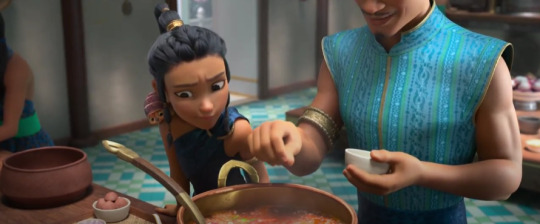
Wealth
I think this might be something that is universal, but food in SEA culture can mean wealth. What ingredients do you use? How much rice do you have? Do you eat something with your rice?
Now, “wealth” in this sense does not necessarily have to mean monetary wealth. It could be the wealth of the land you live on.
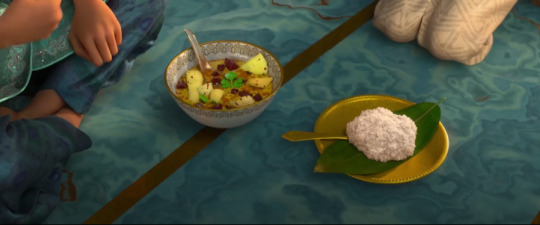
I’ve already talked about how important rice is here. However, here is a quote from that analysis to highlight the importance of the above scene:
There is a scene towards the beginning of the movie when Raya asks Namaari, “Stew or rice?” when asking which she would prefer. Namaari never answers the question, but she says that it is her first time eating rice in a while. Though it’s never explicitly said, it could be implied that it is because they did not have as much rainwater for irrigation at the time.
Namaari’s people lacked wealth of land in the beginning. With rice being such an integral part of SEA food culture, that is sad.
A welcome into a home
One of the first things Raya says to the other tribes at the beginning of the movie is, “Who’s hungry?” You can hear phrases similar to that peppered throughout RATLD. “Have you eaten yet?” is another one.
When Raya asks, “Who’s hungry?” in the beginning, it is to welcome a huge crowd of tribes into their land to share a meal. The first thing someone in a Filipino household would do when someone is visiting is to ask if they’ve eaten yet. If they haven’t there is always a meal that is ready for them. Honestly, the meal might even be prepared for them already even if they weren’t asked.
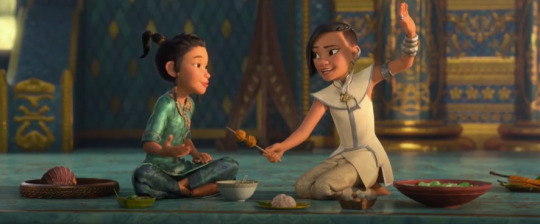
Here, Raya and Namaari share their first meal together as the very first thing they do before they do anything else. It is food to welcome Namaari and the others into her home.
You can notice that they are sitting on the floor. This doesn’t necessarily happen in all of SEA, but sitting on the floor on top of mats or a spread like banana leaves to eat is common practice, even for royalty.
Togetherness and friendship
Eating with family or to welcome someone into your house are not the only reasons why eating together is important. It is also a symbol of being together. Even if you don’t have a family and you just live with roommates or friends, you might eat meals with them on the daily.
You share the food. That’s important. Say if you lived with a roommate. In this culture, you might cook a meal for both of you, not just yourself. You might cook together and contribute different dishes. That’s not to say there aren’t exceptions, but this is what I’ve personally observed between my own SEA friends versus my non culturally Eastern friends.

This is where culturally, the East and West seem to differ a lot. Western society is based on an individualistic culture. Meaning, the focus is on the individual and independence. There is less group mentality. Eastern society is based on a collectivist culture. The whole group is taken into consideration. This can be true for both East and Southeast Asia.
You can see this as the case in RATLD. As the movie progresses, so do the meals. Raya sits down to eat with her friends, and there is rarely a time she eats without someone.
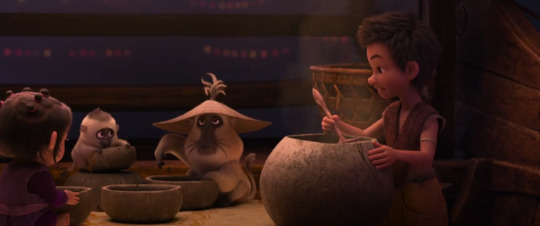
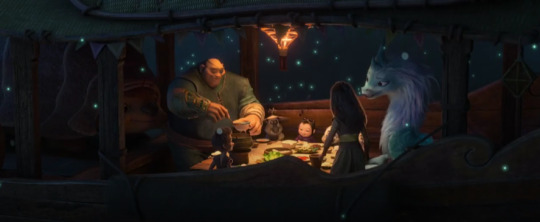
Gift giving
I’ve mentioned that welcoming someone into your household with food is a part of SEA culture. However, it is important the other way around as well.
Sisu does mention a few times that she thinks that they’re best off giving offerings or gifts to the chiefs to show that they mean well. Now, it is common practice in some SEA cultures (and particularly from a Filipino lens), to give someone something when you visit. This doesn’t have to be every time you visit, of course, but it’s seen as nice and polite if you give a host something if you plan on staying there a while.
For example, if they are providing room and board for you on a visit for a few days. Even if the host is a family member, you should offer them something. Anything could work, but food is a good option. And it’s a great, safe option. Who doesn’t like food?

Sisu does try the gift route in Talon. She tries to buy a bunch of trinkets, which inevitably fail. The second time she tries? She snatches a pot of (what I’m assuming) is congee to offer to the chief of Spine.
It’s also interesting to note that this is the only time in the whole movie that gift giving doesn’t backfire on them. In Spine, they meet an enemy-turned-friend, Tong.
Trust
Ah, the theme of the entire movie...trust. What does sitting down for a meal equal? Trust. You’re trusting someone to feed you, to give you something good to fill your belly, to essentially be vulnerable with you. Sleeping is a vulnerable time, but eating is as well.
You naturally let your guard down when you eat, and if someone cooks for you, you don’t expect to be poisoned by it.

In the start of the film, Raya is skeptical of the congee that Boun makes. She eats it anyway when she sees that Sisu isn’t poisoned. Obviously, this is a particular issue specific for Raya’s character development. However, it is a part of the process.
By the time we reach the end credits, things come full circle.
Raya expresses throughout the film that she wishes she could eat a meal with her father again. I’ve also pointed out how important it is to eat together with friends. All of that is showcased in the credits when the cultural importance of food, trust, and togetherness return.
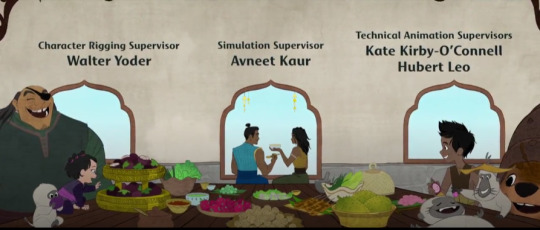
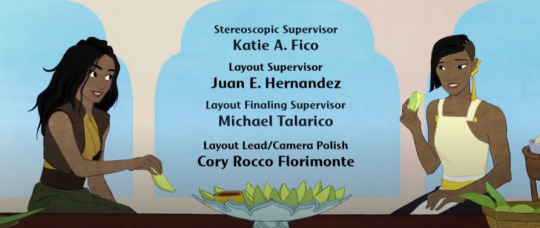
Raya and Namaari share a meal again. This time, as real friends. (Maybe even...lovers? I cannot unsee it, Disney.) This meal they have together is more of a snack, but that is something of note as well. It’s something intimate because they’re sharing sliced green mangoes with shrimp or fish paste dip (bagoong in Filipino Tagalog). They trust each other enough to share the same dip, to cut up the same mangoes, and to sit together over a meal.
If that isn’t the essence of SEA food culture, I don’t know what is.
#raya#raya and the last dragon#ratld#ratld spoilers#raya spoilers#disney#raya analysis#analysis#raya and the last dragon spoilers#sea#southeast asia#philippines#food culture#this is what i did instead of writing what i should've been writing#sisu#namaari#boun#tong#kumandra
224 notes
·
View notes
Note
Is there anything in a person’s chart that indicates them being a good or bad hearted person? Like someone who is really altruistic and cares for others or a bully or criminal lol
That's a tough question, but no. This is one of the things I don't agree with a lot traditional astrologers who think astrology is moral character defining. Most of the astrologers who think like that are just thinking astrology is giving them all the answers, without going to the philosophical and epistemological foundations of astrology. First of all, good and bad in our context are always charged with christian moral values and the planets aren't christian lol. Second of all, you're not defined by the thing that tells you who you are, because the thing is just telling you. This doesn't mean that astrology is neutral; on the contrary, it amounted a lot of religious and cultural values through the ages. But context is everything and what forms moral values is culture.
I've seen an astrologer defending that the language of dignities and the benignity and malignity of the planets talk about good and bad, which is just dumb. Benefic and malefic planets are defined as such based on their propensity to life. Life and fertility isn't good or bad, and sometimes it can be very unwelcomed, for example when a virus spreads, or when a bunch of mold grow in your food. Then you'll need the malefics, a sterile and isolated place to stop the virus, or the dryness and coldness of the fridge for your food. A lot of the roman astrologers outlined that planets in detriment can mean not only exile but also imorality. While I agree that exile can be uncomfortable, meaning that you don't have your resources because you're away from home, because you're like a foreigner or whatever, roman astrologers did put a lot of their moralism onto their analogies, even to make it easier to teach and understand, and you can't trust romans to talk any good about exile and foreigners. Horary astrologers are still using this moralist language today, especially the more reactionary and conservative ones.
Some people might use the concept of daimon to say astrology is necessarily essentialist. Heraclitus said "Ethos Anthropos Daemon", which is a very tough concept to translate, but Dorian Greenbaum has translated it as "Character for a human is his daimon" and she's quoted some people in her book that have translated it to something like "A man’s character is his fate", or "A man’s character is the immortal and potentially divine part of him" etc. I haven't read enough about this and I can't tell you what I'm saying is certain at all, so I recomend reading Dr. Greenbaum, Heraclitus and other people to think better about this. But studying astrology has made me think a lot about that quote and by allowing myself to be absurdly arrogant, I'll tell you about some not that well thought out elaborations I've come to. And if one day you read more about it and find out that I'm horribly wrong, come tell me, please.
Daimon is at the same time spirit and destiny. We tend to separate purpose/destiny/fate from spirit and that's a result of our modern individualistic understanding of the human spirit. I don't know if that makes sense to you, but here I think destiny is not something a spirit has; but it is it. Try to call your destiny "spirit" and vice-versa to get used to it. You can see that in how the Sun in astrology symbolizes the spirit and also the overall life trajectory. What Heraclitus is saying here is that you are not separated from daimon either. Daimon (spirit/destiny) is you, your life, your character. What does this mean for astrology? It means a chart is at the same time talking about a destiny, events, a life and a character. And those are inseparable because they are the same. But still, this is not saying anything about good and bad.
It's also philosophically impossible that predictability would necessarily generate an ontological essencialism. A lot of cultures that use the sky as an oracle believe in a kind of fate, meaning that everything, the things you go through and the things you do are predictable by the stars, but that doesn't mean the sky determines who's "good" and "bad", neither that you have an essence. The moral debate of good and bad is, like I said, very christian. Not all cultures have that hard dualism and definitely not all cultures are defining good and bad in the same way. Also, the chart is showing your predictable demeanor, but to say that that's your essence and that there's no context, or environment, or relations that affect it, would be a huge leap and we would all be in The Sims. But existence comes first.
When I was reading about the babylonian constellations of the zodiac, it really struck me how Leo used to be a sign that gave the most horrible omens and how positive and nice Aquarius was described as. Libra and Aquarius were described as very especial and sacred signs for the Sun god. And today, the saturnian signs are not seen as good, while Leo is very compeling, beautiful and warm etc. Even in traditional astrology we associate positive things to Leo and the Sun, but negative things to saturnian people and signs. It got me even thinking about Foucault's analyses of power, when he talks about the world's transition from a system of gorvernmentabily with sovereign power to one with disciplinary power. In a nutshell, the villains changed. I feel like that's a good example of how astrology doesn't define good and bad. Culture does.
12 notes
·
View notes
Note
Hey, did you get a chance to watch season 6 of Lucifer? What did you think of the finale?
This is going to be salty (sorry) so I put it under a cut for people who prefer joyous things in the feed.
I didn’t like the final season.
To be brief:
It felt like a story where the writers knew how they wanted it to end, and therefore the plot ruled over the characters. It wasn't a main plot I enjoyed at all, and it was told in a way that made it difficult for me to appreciate even the small bits I liked. (Ella reveal. Ghost Dan.) I thought it suffered from a jarring tonal shift and when it comes to several overarching themes, I felt it negated/trivialized previous seasons. In many ways it also managed to be both cheesy and cruel, often at the same time. I had the impression it was a compilation of (unfortunately rather boring) fandom wishes and tropes more than authentic storytelling.
To be anything but brief:
I dislike the season in part because it undid a lot of great things about Lucifer as a character.
By the end of 5B Lucifer had come full circle. I think that season finale is great. The Lucifer vs Michael fight was so well done thematically - he fought himself, and unlike the first fight in 5A when he wants to hurt his twin he had now reached a state of personal growth, of compassion. Not even when Michael kills Chloe does he deserve death because everyone deserves a second chance. And then the funny and pitch perfect “Oh, my me”. Ambiguous enough about the details to fuel the fandom, clear enough about the themes and the lore to offer closure. (No, Deckerstar didn’t have a date or much of a snog but I can fill in the blanks there though I am aware that many fans were disappointed by the lack of on-screen love.)
Excellent way to end the show.
Except they didn’t.
S6, I feel, tried to tell the same story all over again, only not as well or even coherent.
Over the seasons it’s been pretty clear that while Lucifer can be caring, he mostly cares about the handful of people in his life. S6 even touches upon this, has him trying to care for random people in their hell loops. But S5 already did this, but better, with Michael. The family dinner with God was excellent, it showed broken people all around and had Lucifer, the self-centered drama queen of the family realizing that he’s not the only one that’s been hurt. It showed the best and worst of them all. Sparing Michael, considering Michael worthy of redemption, was peak growth for Lucifer as a character because in that moment he also considers himself worthy of the same thing. That’s when he truly forgives himself. I thought.
And then season 6 shows Michael as a prisoner in Hell, just once, never to be mentioned again. Is that a second chance? Is that redemption? Is that really the symbolism they were going for or just a spiteful and stupid little addition because LOL SOME PEOPLE DESERVE HELL. (Do they? Says who? The show doesn’t answer that because the show that focuses on the neutral character the Devil and the totally untarnished place Hell doesn’t much care about such divisive matters, but more about that soon.)
I dislike the season, in parts because I wasn't satisfied with the moral/quasi-theological backdrop.
The system is wrong, Lucifer concluded by the end of 5B.
Season 6 has him return to the system, as an Afterlife Coach of the Damned. Is that really the best they could do?
I mourn all the cool possibilities of what Lucifer, the advocate for free will and defender of desire, could have done with hell as a concept. Blown it apart, closed it, tossed the keys to someone else and rode off in the sunset. At the very least he could have altered it so that it’s no longer solitary confinement but a collective of doomed souls trying together to achieve redemption but hey, never mind me, I’m a bleeding-heart socialist and I don’t believe in revenge and I don’t believe in God but if I did, God would forgive. Otherwise, what the hell is the point?
I parsed through the season with my husband, a real-life minister who doesn't think anyone deserves hell and who gets to suffer my long-ass questions about the theological themes of popular culture a little bit too often. Because we both felt slightly insulted after watching. "Is this bullshit what they offer me?" my husband asked me as the timey wimey time travel plot unfolded. But timey wimey bullshit aside, we concluded that the real reason we were both so annoyed and frustrated with the season is because it highlighted how flat the background lore really is. I mean, I guess they wanted to be yay, neutral and non-divisive themes galore! It’s good to be good, folks! If you’re not, well, I guess you might have your spine broken by the Devil or sent to a never-ending hell loop but let’s not talk about religion!
The main issue, for me, with the whole system of heaven and hell and earth on the show is that for every equation, there’s a part missing.
The show has borrowed the character from the comics verse but left the entire lore and its internal logic behind. It borrows a bit of moral philosophy, but cuts away the troublesome bits otherwise Lucifer can’t both be on a redemptive path and happily slaughter people in fits of vengeance; it uses Heaven and Hell and vaguely also the concept of sin but never answers any questions about it, apart from the central message of course: it’s up to you. In fact, the show discourages questions about the lore because it has no answers. It doesn’t care. The ending of the show brushes off the much needed systematic changes of heaven and hell like it’s just another joke. (Want to know a show that has compassionate writing about morality while managing to be very funny? The Good Place. And you know what, morality should be serious. I’m a softie and again, a bleeding-heart, but it’s important to be a good person and it’s important to get a chance for redemption. It matters. It’s not just a minor detail.)
Which brings me to the damn therapy theme. I know a lot of people like it and I have also liked it a lot in previous seasons. I have. It’s been quirky. (Also highly unprofessional, but hey.) But as the key to your afterlife/redemption/second chance it’s just not good enough.
It is so very, very individualistic that it makes my skin crawl. It’s the ultimate American solution to systemic injustices and suffering - hey, it’s up to you, man. You decide if you deserve hell. You decide if you deserve Heaven. You make the difference! You can do it! Live the afterlife dream, achieve all your goals, get a hell loop that no longer loops but… stays in one static place where at least you’re moderately happy.
Navel-gazing into your soul is certainly one way to get some insights into your mistakes. But it’s not redemption. Redemption is an active choice to be a better person. You don’t have to earn redemption or deserve it. And redemption isn’t the same as forgiveness either. Redemption is the opposite to pointless, everlasting punishment. It’s hopeful and it’s ugly and it’s full of purpose and the chance to be better and add something good to the world.
Even Lucifer doesn’t get to do that on the show. He deals only with the already doomed. The here and now on Earth fades into the distance as Deckerstar, too, gets their happily ever after in Hell.
You’ll get pie in the sky when you die. Or you get to shag on a throne in Hell.
Either way, life on Earth doesn’t matter. (Here the show lean into some really dodgy Christian themes, I’d argue, but hey, it’s not about religion! It’s just a fun romp about a reformed bad boy!)
“Hell is just revenge porn for fundamentalists and other people who believe in eye for an eye. I just want there to be a level of collective forgiveness and hope, you know?” I told my husband whilst chugging down beer. As you do when you watch crap that makes no sense. “A level of hey, I’ve got this, I forgive you, you can do better. Go and do better. And then the actual opportunity to do so, even if it's just reliving your life as a ghost again and again until you figure out what went wrong.”
“Honey,” my husband said. “I hate to tell you this since you’re an atheist but that level you’re talking about? That’s Jesus.”
Well, screw that.
I really don’t want to need Jesus to make sense of a story. I just want decent bloody storytelling.
26 notes
·
View notes
Text
EREN JAEGER AND THE ENNEAGRAM TYPE 6
First of all, to my followers, please excuse me. This account isn’t for SNK but it’s the one I have and I wanted to write this.
Secondly, I hope this post finds the fandom lol. But if you’re expecting this to be another meta to judge Eren’s actions, don’t waste your time. The enneagram is a tool of understanding, not judgement, and I just wanted to share one thing I appreciate immensely about Eren’s characterization.
Well, why don’t we start with chapter 137? There, Zeke states that life’s purpose is to propagate and it’s core fear is to be extinguished. In other words, from the moment we are born, our organisms need to survive. As humans, we are on our own: suddenly, you gotta breathe on your own; the food is no longer provided. Everything is scary. A baby cries because everything is hard and far away and something in their biology tells them to keep fighting to survive.

Now, onto a more spiritual approach. In El Eneagrama de la Sociedad, Claudio Naranjo says that several cultures have their own ideas and tales regarding a disconnection from a primordial state of wholeness. Once born, we become individuals and are separated from the Universe, as if we’re no longer in sync, and something is lost in the process. How can we survive? Our defense mechanisms start with that question. We need love, we need resources and we need to stand our ground in this cruel, but beautiful world. This, on the enneagram, is called “childhood trauma”.
What I want to do in this post is to break down Eren’s character development through the lens of the enneagram, but for that, I need to give you an overview of the system. It is cruel and beautiful, just like the SNK world. It sees us with care and understanding but it also exposes the harsh truths we don’t want to see.
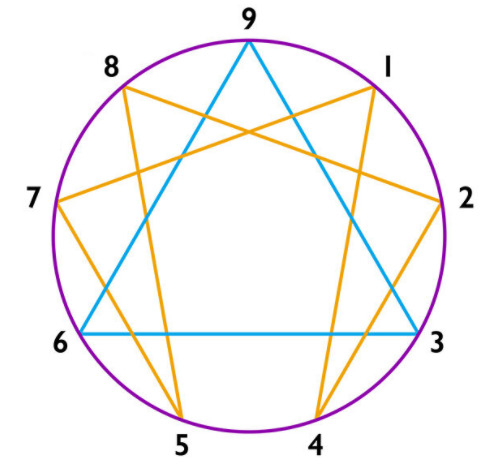
The enneagram, first and foremost, is an ancient symbol, a figure of nine points connected within a circle. There’s a lot of fascinating history to it, but I’m gonna focus on what matters to this post. The enneagram is a personality system that encompasses nine essences of the Universe, and once our childhood trauma sinks in, we attach to one type which defines our worldview. Here’s how each enneatype manifests itself:
Type 1, the reformer: this person seeks to not make mistakes. They are principled and meticulous in everything they do but highly critical of themselves and others.
Type 2, the helper: this person seeks to be needed. They are proud of their independence and helpfulness but believe they can only receive love if they give first.
Type 3, the achiever: this person seeks to be worthy. They are motivated and ambitious but shape themselves around what is expected of them.
Type 4, the individualist: this person seeks to build their identity. They are sensitive and creative but reject the ordinary and focus on what is harder to reach.
Type 5, the investigator: this person seeks to be a specialist. They are perceptive and curious but withhold themselves and their resources and worry they’re never prepared.
Type 6, the loyalist: we’ll talk about it in a moment.
Type 7, the enthusiast: this person seeks to avoid pain. They are joyful and spontaneous but afraid of facing hardships and being swallowed by negativity and sadness.
Type 8, the leader: this person seeks to be strong. They are fierce and protective but don’t allow themselves any vulnerability and need to be on top.
Type 9, the peacemaker: this person seeks to be in peace. They’re kind and their inner stability is unshakable, but have a hard time asserting themselves.
So what does it mean to be a type 6?
Some of you might not believe if I told you that Eren is moved by fear. But that’s what it is. The type 6 represents fear itself. It’s our search for safety and support. The person who is a type 6 has disconnected from their inner guide and they don’t believe they have the same capability to make decisions as everyone else. That is more of an unconscious state, which manifests through an overly alert stance. Sixes are always on the lookout for threats and danger, their minds work predicting things that can go wrong, so they can be prepared. In other words, the type 6 fears how imprevisible life is, because they truly don’t find in themselves the compass to the answers they need “in this very moment”. They have to be one step ahead and they have to find outside structures for support, people in whom to trust and who’ll give them the guidelines and sense of balance. Fellowship and loyalty are essential to the type 6 as they look for reassurance in their concerns.
In Personality Types: Using the Enneagram for Self-Discovery (1996), Don Richard Riso has described nine levels of development for the enneatypes. They are the path from our healthy, healed state where we’re closer to wholeness again (Level 1) down to our most broken state where we’ve abandoned ourselves (Level 9).
When we start Attack on Titan, Eren is on Level 6. Here’s what Riso says:
“In its innocent forms, counterphobia is well employed by people to master their fears — for example, children who are afraid of the dark might purposefully go to a dark room to overcome their fear.”
Eren, too, wanted to overcome his fear since he was a kid. He wanted to go outside and face those faceless titans. He wanted people around him to be prepared, but since the Garrison was incompetent and lazy, he needed to be prepared. Grisha seems to be Eren’s first authority figure. From what we know, Grisha allowed Eren to have his own thoughts and didn’t impose anything on him, which is a kind of reassurance. Thus, with his father, Eren felt more understood.
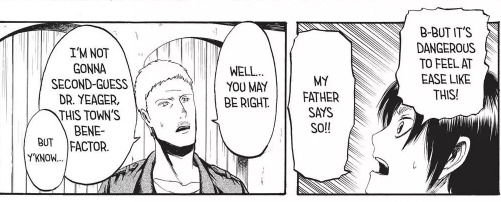
Carla, on the other hand, wished for Eren’s immediate safety and cared about him living a quiet life. But that also means she couldn’t understand his concerns, and the type 6 interprets that demeanor as vulnerability — his mother is more exposed to the threat. If the type 6 is a room where nobody is vigilant, the only option they see is to step up and become hypervigilant.
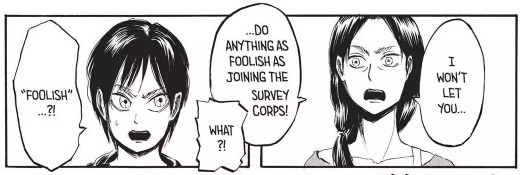
This relation to an authority is very specific for the type 6 as they search for people and systems in whom to rely on. Since the Garrison aren’t the most reliable soldiers around, Eren turns to the Survey Corps. That section of the military consists of the rebels, those who want to explore the unknown, understand the titans and figure out the best way to fight the enemy. The SC wants to be free, so they become Eren’s next “authority figure”.
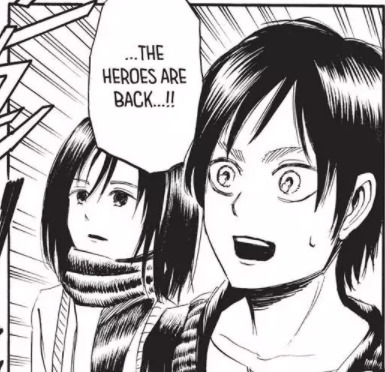
Riso also says that the type 6 in Level 6 has a more aggressive stance and wants to prove to others that he isn’t indecisive and can’t be pushed around.
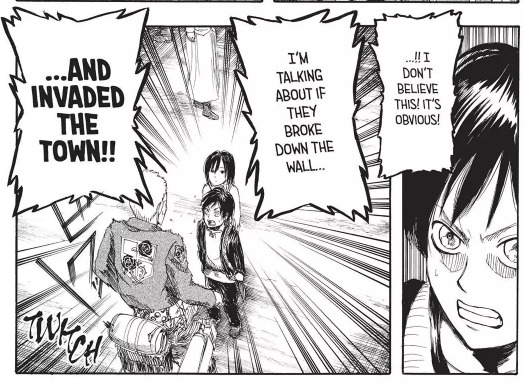
“They blame and berate whatever threatens them. They become rebellious… and are desperate to latch onto a position or stance that will make them feel stronger and dispel their feelings of inferiority.”
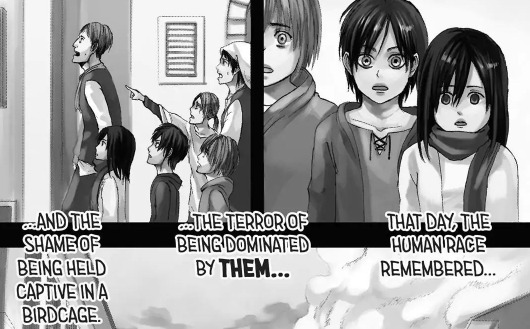
The type 6 feels inferior because they feel lost inside. Eren, too, knows that the threat lurking behind those walls is much bigger than him and a single human doesn’t stand a chance. And he berates people around him for not seeing what he sees, or for disrespecting his “heroes”.
Eren will be back to Level 6 later, embodying other aspects of it, but let’s talk about the moment he joins the army.
At this point, Eren reaches the stable position he has been eager for. He is part of a group and working towards his goals, he feels more confident because he’s preparing for the next attack. He has climbed to Level 4:
“The security which groups and institutions provide far exceeds the strength of any individual members...”
As we know, Eren sees his mission to eradicate all titans also as a social responsibility. The type 6 can easily fall into “us versus them” mentality where they are putting effort into something and will trust only the people who understand the importance of it. Eren’s bickering with Jean, as well as his admiration for Reiner starts from there.
“And even within their own group, average Sixes make it their business to find out who is pulling the weight and who is not... If others are not loyal or committed, it not only makes them angry, it threatens them.”
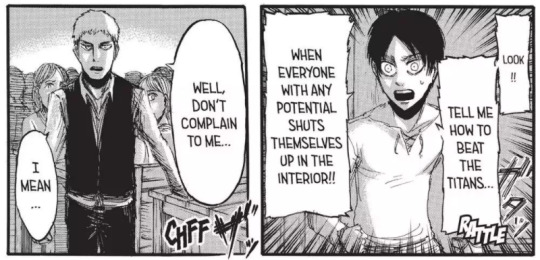
Eren talks over and over about how he’s going to join the suicide squad, to the point people start making fun of him. But he is testing everyone’s commitment to the cause of “fighting titans” and he finds people like Jean, who only really want their safe life, as well as Reiner, who is dedicated and understands him immediately. Reiner becomes his new “authority figure”: whenever Eren’s failing, Reiner is there to understand him, to offer help and to remind him of why he’s there.

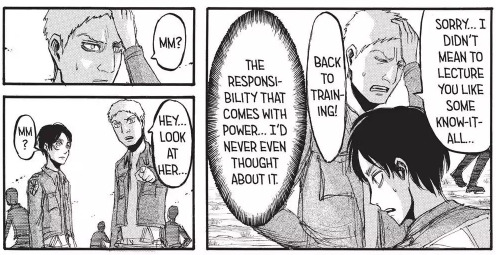
“The loyalty of average Sixes for the people with whom they have identified is almost without bounds. They find it extremely difficult to break their emotional bonds, even should they desire to do so… Their love may, in time, turn to hatred but never to indifference.”
That one speaks for itself. It’s exactly how Eren felt upon RBA’s betrayal. He’s in total denial about Annie, while for Reiner/Berthold all he has left is rage.
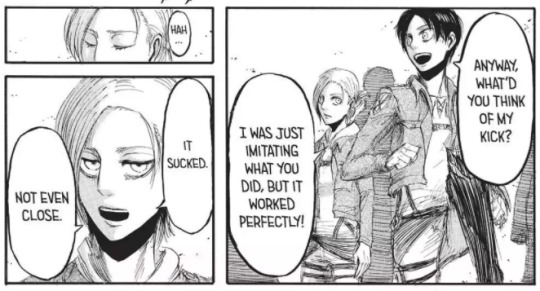
Choosing who to trust is part of the type 6 identity. All of their beliefs, all their inner world is shaken if they are betrayed, because the network they build is how they find a safe space for themselves in the world and how they orient themselves. Annie was Eren’s parameter of fighter, Reiner was Eren’s parameter of leadership. The first backstab is too hard for him to process, we see it all unfold. He can’t admit she’s a traitor, and he doesn’t even have the will to transform and fight her.

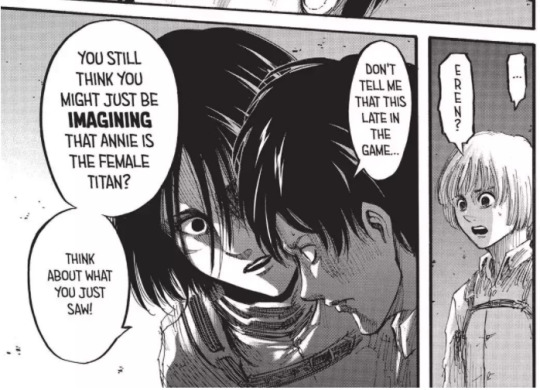
The second one, however, is embraced somewhat faster and he’s even able to contain himself and play along. But it doesn’t change how deeply it affected him and how vengeful he gets. Years later, that hatred would dissipate, but never to indifference — Eren still feels a need for some closure between them.

I got ahead of myself on the timeline, so I’m going to rewind to the moment Eren joins the Survey Corps, which is his childhood dream. Erwin is his main authority figure now and you see that, even though Erwin locked him up, he trusts the guy. As Don Riso explains, the type 6 on Level 4 plays by the rules of his group because he strongly believes in those rules and they bring comfort to their minds. In reality, the SC doesn’t really know what they’re doing. Erwin himself doesn’t know how he’s gonna cross the walls and find out the truth. But Eren is devoted to them. Their cause is his cause and he knows how hard it is but what matters is they’re trying. Besides, they embrace him. They want to reach the basement and want to defend him on the court and want to investigate/use his titan power. Thus, for Eren, the SC is the most solid and welcoming place to be. He’ll do whatever they want from him.
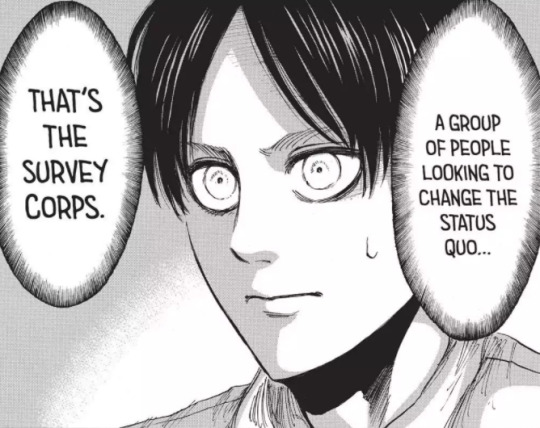
However, Eren was about to find out that things were far from glorious out there. Although the Survey Corps work under strict “plans” that soldiers are supposed to follow blindly, Eren can’t just watch people being sacrificed to protect him. Especially when he has enough power to act in a more significant way than those individual humans. But how much control does he have over his own power? Eren can’t answer that, and he feels immensely conflicted as soldiers continue to drop dead.
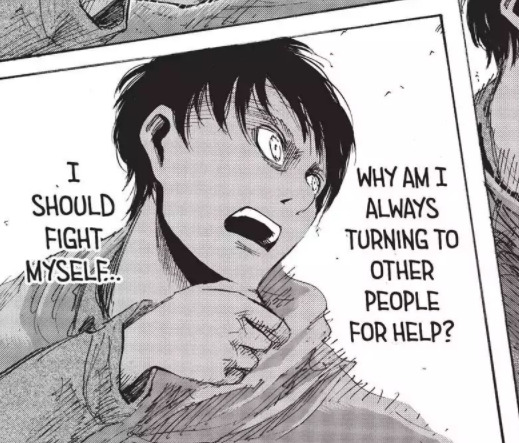
In that moment, Levi could’ve forced him to follow his orders, and perhaps that would’ve eased his mind when he chose not to transform. But the captain is a different kind of leader than Erwin, and he challenges Eren instead:
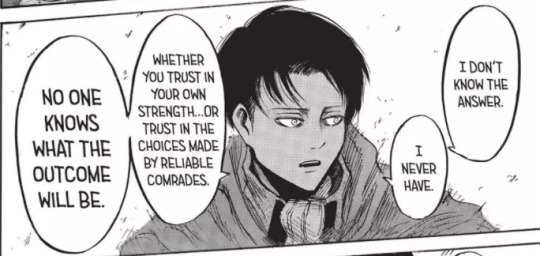
And I really appreciate how fitting that is to the type 6 conflit. It’s very difficult for them to accept it, sometimes there simply isn’t a clear path, sometimes it is okay to trust yourself and act on your own. But this is what Eren’s thinking:
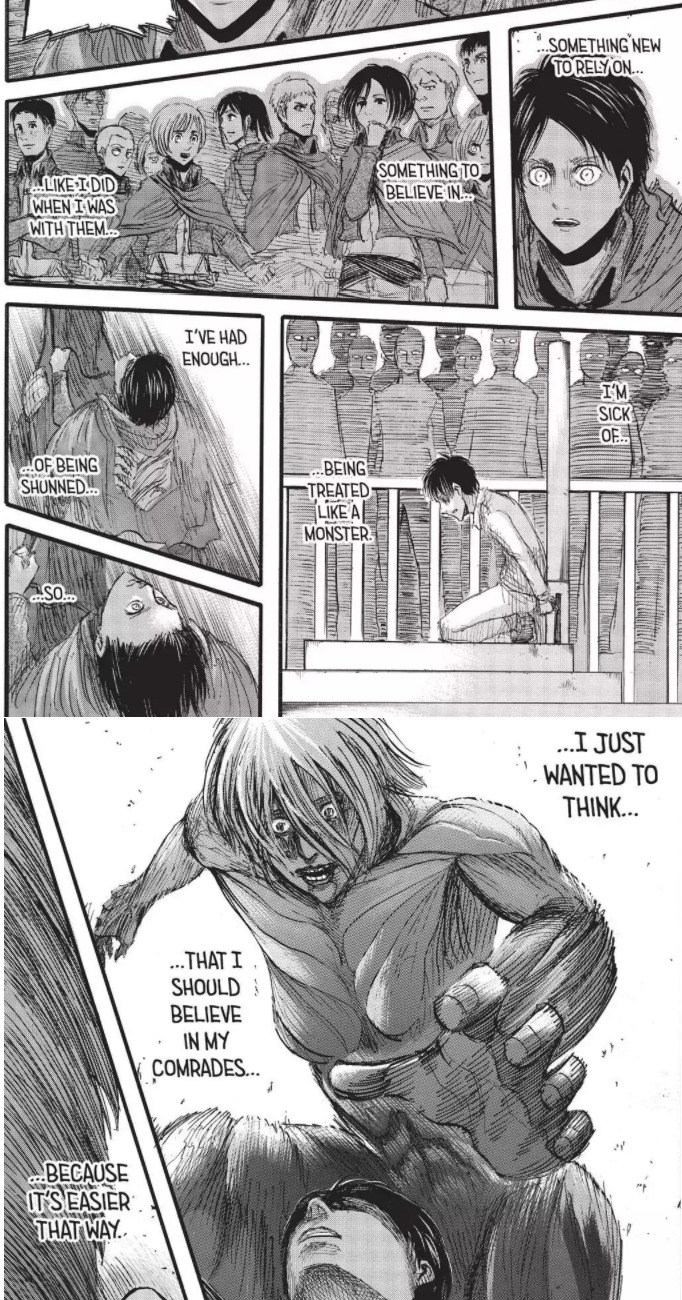
That didn’t turn out very well, did it? At the end of the expedition, Eren is forced to admit that the SC don’t have all the answers and that all his power and training can’t always keep everyone safe. He’s once again reminded of that after activating the Coordinate — not even the power to control titans can avoid sacrifices.
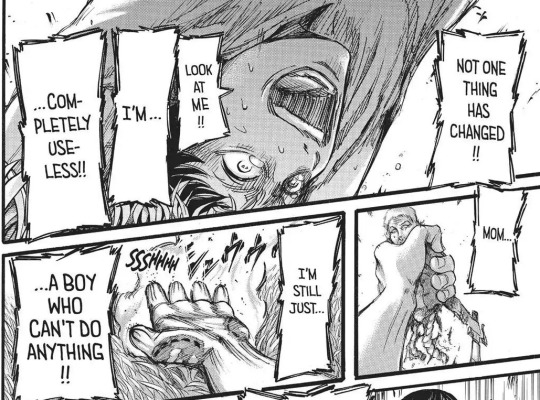
Ideally, the type 6 can only reach the safety they seek once they allow themselves to move in the chaos with the courage to face it step by step, instead of predicting it. This may sound easy for others but not for them, especially if they are inserted in a reality where the cost of a mistake is lives.
So we get to the Uprising arc. It starts with the Survey Corps planning the retake of Wall Maria while they put Eren through hardening experiments. Time is not on their side and Eren’s determined to go beyond his limits during the tests.
“They consequently try to further strengthen their ‘social security’ systems by working harder to be accepted and approved by their allies and authorities… Others wonder if they resent the workloads and pressures they seem to be under, yet Sixes seem eager to fulfill their obligations and duties...”
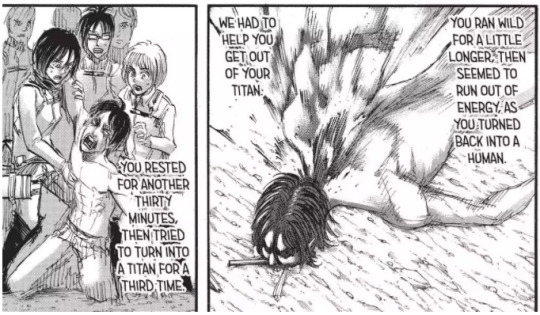
Eren’s entire world would fall apart again once he’s kidnapped by Rod Reiss and discovers the truth of his father’s sin. Like I said earlier, Grisha was one of Eren’s authority figures, and even though he was absent, the basement key and the promised truth kept son and father connected. Wherever Grisha was, Eren could still count on the answers he’d left behind.
That is, until he is hit by a trainwreck of a revelation that his father killed an entire family and sacrificed himself to pass on the titans to him. Eren’s left completely lost, he no longer knows what to think of himself, of the world, of his father.
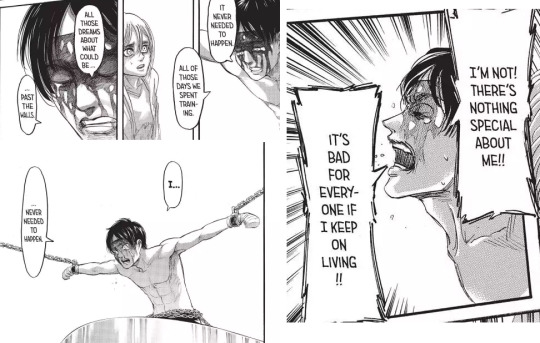
He falls from Level 4 to Level 7:
“Sixes become trapped in an unhealthy pattern of self-disparagement and massive insecurity which reinforces feelings of inferiority and worthlessness, a marked deterioration from the indecision and evasiveness we saw [before].”
This shift to a much more confused and self-loathing state doesn’t last long because Eren has his friend’s support for now. Historia chooses to see his worth and let him live. Levi once again challenges him to make his own decision, and Eren manages to save the day.

As Eren becomes aware of those destructive feelings, he tries to get rid of them by “fighting” himself, in an attempt to put himself back up.

He realizes he isn’t alone and he doesn’t have to do everything on his own, people around him are also strong enough to stand up for themselves. That helps him return to a more average stage and it could have been the beginning of his growth...
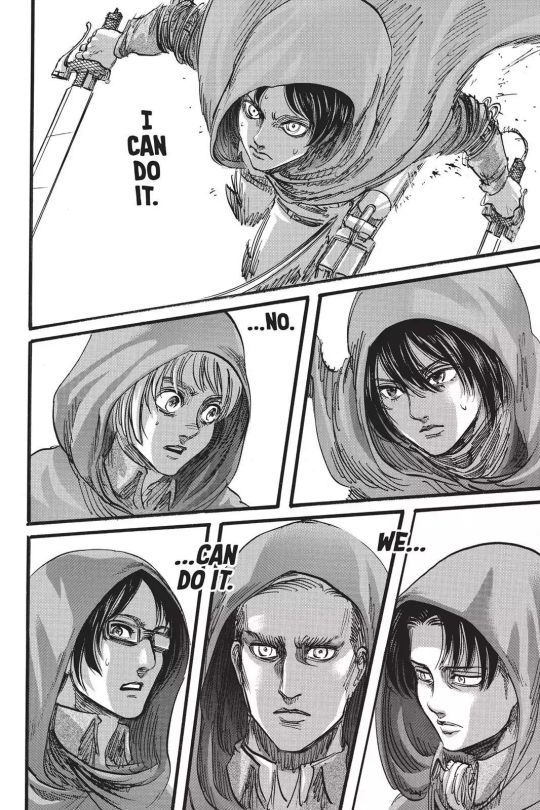
Well, if only life wouldn’t have a surprise waiting for him at every corner.
I hope you’re being able to follow and understand that we all have ups and downs in life. The levels of development represent exactly that, so it is common to find yourself in the same stage in different periods of your life. Nevertheless, after Eren learns the truth about the world and sees his future memories, it all goes downhill for him, no turning back anymore.

Here is what Riso comments on the ambivalence of the type 6 on Level 5:
“Sixes begin to follow the narrow path between the expectations of their allies and authorities and their need to resist having any further demands placed on them.”
Eren is overwhelmed by the view of the outside world. He has experienced his father’s memories first hand and it’s nothing like what he expected. No one around him has the same perspective. A lot of self-awareness and self-doubt emerge from the future memories he saw through Historia. Riso explains that on Level 5 the person starts to become more worried about how their allies feel about them.
“They become skeptical of new views and ideas, feeling that they have already put a lot of effort into understanding the perspectives and approaches they already know.”

Eren went from “I HATE TITANS ALL TITANS ARE MY ENEMIES DESTROY ‘EM ALL” to “titans are my people and they haven’t chosen this horrible outcome”. And that’s A LOT to process when you wrapped your life around that initial idea. But things are changing even faster, and his friends are talking about how the enemy could be reached out too. This thought needs to coexist in Eren with the clear image he has of the enemy, one that only he has accessed. Add to that how Eren was kept away from the Marleyan prisoners as Paradis also feared some kind of betrayal. As long as there’s people out there against them, he can’t so easily rest.
Who knows at what point Eren returns to Level 6. The time skip is covered very loosely. But probably when he is feeling so lost that he actually comes to Historia to vent.
“As in other types, to be functioning in this Level or lower usually indicates that there were extremely dysfunctional elements in the child’s environment.”
Self-explanatory. It’s even hard to talk about Level 6 because it is a point where Sixes start to overthink threats that aren’t that big, but in Eren’s case, the threat is 100% REAL and there’s a world isolating them and wishing for his people to die and throwing gigantic creatures at them. No big deal at all.

Eren turns to the people who actually understand the urgency he feels. Floch is eager to follow him, while Zeke and Yelena have an actual plan. Eren says he’s acting out of his own decisions, and he sure is, but he has also left it in Zeke’s hands to set the course. At this point, it no longer is a positive thing for the type 6 to have reassurance instead of a grounding support, it’ll only leave them trapped in the current mentality.
What would be more appropriate would be a balance between rejection…

…and full acceptance.

(By the way, I can’t even know where Historia stands, since she let him do his thing, but I’m still using her here because of how immediate her reaction was, which could lead Eren to think he can’t risk telling anyone else. Unhealthy Sixes are just that paranoid.)
Zeke could have been Eren’s new “authority figure“ if their goals were the same. But more and more the only thing Eren is starting to rely on are the future memories.
Riso talks about how a violent environment would lead to violent actions and “they end up using the same aggressive tactics on others”. And I can draw a parallel with how Eren has been facing titans for so long and watched them take people from him, that he just feels aggression arise whenever he thinks of all the injustice he has witnessed. Same would happen later on, when he sees Ymir’s memories and finally decides to unleash this pain on the world.

“It’s hard for Sixes to work for something. Instead, their energies are galvanized by being against people and things.”
Despite being highly conflicted and problematic, Eren so far has waited. It’s too hard at this point to fully engage with those dreams, but he has watched things unfold and allowed the Survey Corps to do their stuff and try to contact the outside world. On Level 7, the type 6 is just going through the day with little hope. When the SC reaches Marley and Eren meets the boy of his memories, he can no longer escape from facing himself.
“Tearful and obsequious, they are disgusted with themselves for not having been tough enough to stand on their own two feet, to defend themselves, to be independent.”
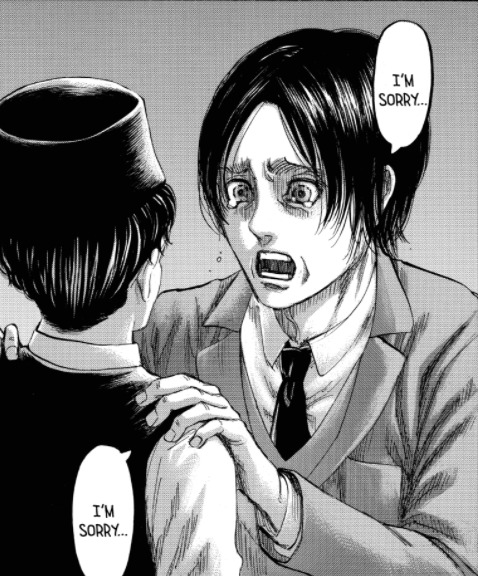
Not only Eren, but Paradis as a whole, have been unable to be independent in a much bigger world, or this is how he sees it after Kyiomi monopolizes the resources and the pro-Eldians group rejects the island. Finally, Eren recognizes in himself the person who would be capable of trampling the kid he currently wants to save, and that leaves him disgusted.
“They do not necessarily deceive others maliciously, but to escape punishment or abandonment. They believe they may be able to repair the damage they have caused...”
What Riso is saying here is that the type 6 feel the need to hide (themselves) so their loved ones won’t abandon them. And again, in Eren’s case, he has a damn good reason to think his loved ones might not be super happy if he said he was going to destroy the whole world. Let’s not forget they are the people who counted on him to save the world this whole time, and he is the person several people have been sacrificed for.
All this pressure has brought him this low, but Eren reaches rock bottom when he allows himself to admit he wished for it all to be destroyed. Now, he can no longer face his family (as he would tell Falco) and he has little faith in himself.
Again, Eren’s paranoias aren’t so far from reality because there is, indeed, a world against them, and that keeps feeding into his anxiety. Paradis’s progress is little and the future is uncertain. When the type 6 reaches Level 9, they can no longer get out of this spiral. They know it’s only a matter of time until the threat comes to them. So they call the threat upon themselves.


Eren allowed himself to go as far as understanding his enemies and accepting that they’re the same, but with the declaration of war, he can’t wait anymore.
I already told you the reason: the type 6 needs to be able to predict. That’s the very core of their beings, their minds seek to control events. Striking first is their final attempt to make sure they won’t be taken by surprise. Ultimately, they are lost and desperate to find support again. Here’s what Riso says about the type 6 on Level 9:
“They may drop out, abasing themselves as vagrants and living in skid row conditions, thus allowing their health and minds to deteriorate to the point of no return.”
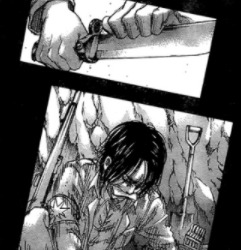
It almost feels like Isayama has read this book, I swear to God. Yeah, that’s word by word what Eren does. He goes to enemy territory, injures himself and throws himself in war. Despite resisting for so long to a new perspective of his enemies, Eren allows himself to see them with his own eyes. All because he’s desperate to understand his enemy, desperate to understand himself (and what would lead to his decision) and desperate to run away from his friends. He is ashamed of choosing those future memories as his new authority figure, get it? They are the most certain thing in his life now. As much as he waited and as much as the SC tried, they don’t have any guaranteed future and it’s just too hard for the type 6, especially unhealthy Sixes, to wait. It’s impossible.
Remember I said that Sixes want to feel understood? Well, I think Eren feels understood, to some degree, when he’s among those broken soldiers. They are relatable, more than anyone else.
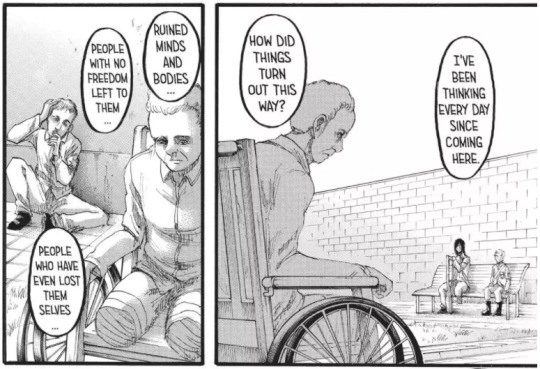
“Neurotic Sixes bring disaster of some sort upon themselves not to end their relationship with authority figures, but to reestablish a protective one. [...] It is also important to notice that neurotic Sixes are masochist not because they take pleasure in suffering as such, but because they hope their suffering will bring someone to their side who’ll save them… as if to say, ‘Punish me, because I’ve been bad. Then you can love me again.’”
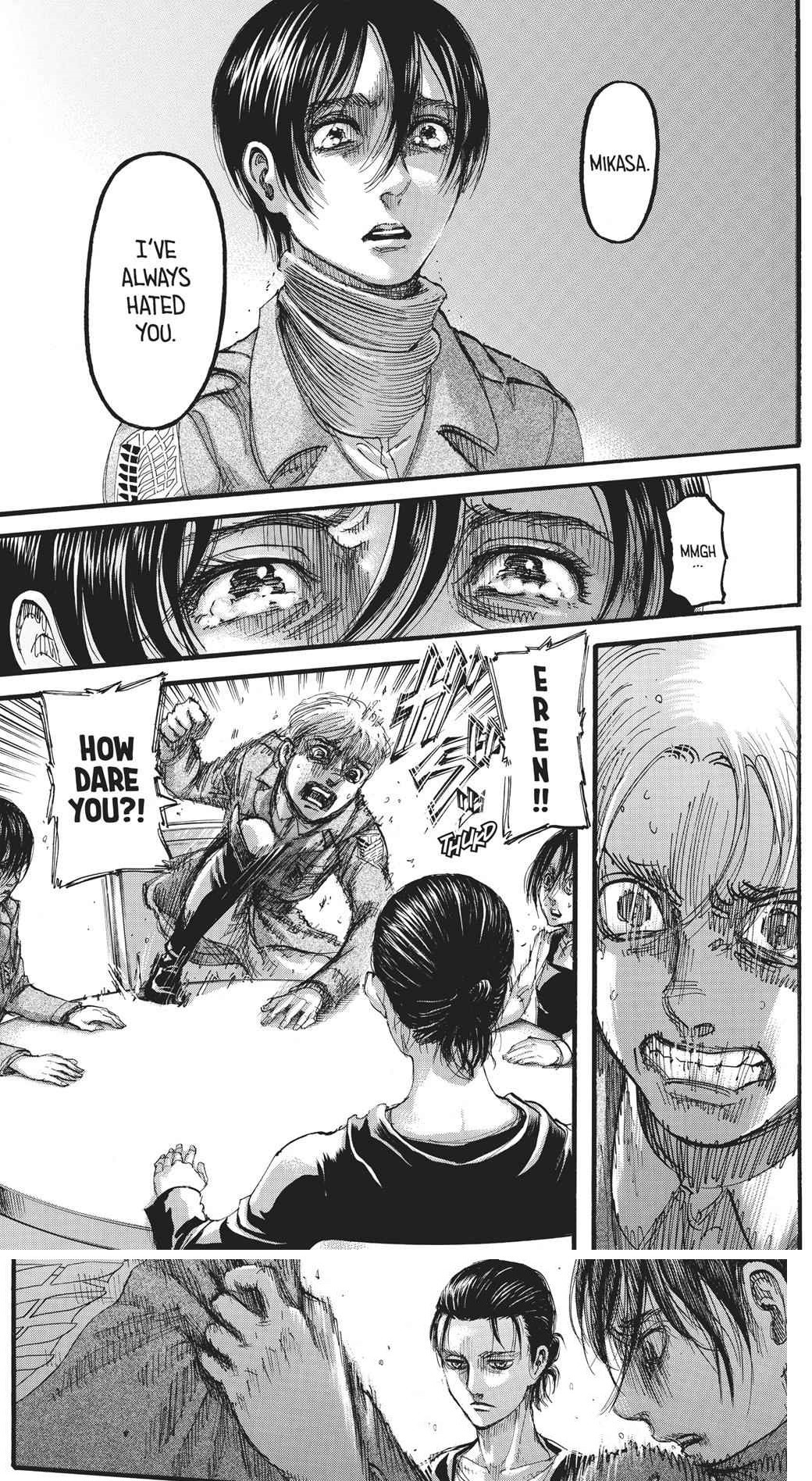
In the mind of the unhealthy type 6, if he can’t find the answers, he can’t be there for his allies. If he fails his allies, he doesn’t deserve their support. But even when he feels he doesn’t deserve it and feels they won’t forgive him, he desperately needs it — the type 6 doesn’t know how to live without support. He is completely aware of his cowardice, he may unleash his despair in innocent people, he seeks punishment for his behavior and hopes for someone to end his pain.
“Unhealthy Sixes are self-defeating persons who are their worst enemies. If they persist in their masochist behavior, neurotic Sixes will drive away everyone on whom they depend. They will be abandoned and alone, the very things they most fear.”
Eren pushed everyone away, but deep down he waited for them to come to his rescue. He knew he was a lost cause, but still couldn’t let go of what he saw as a compromise, a duty to them. His completely cruel and extreme actions are, in enneagram terms, his way to not leave his allies adrift. But aren’t all his actions for his own freedom? I don’t think so, not entirely. There’s a reason the type 6 has been named “the loyalist” — they always, always see themselves as part of a group. And in the end, he saw himself in Ymir, someone who was trapped and waiting to be rescued, understood. Don Riso says the worst part of coming this low is how much Sixes hurt others while they hurt themselves, both because they want to harm everyone who doesn’t understand and to show people the worst in themselves; they want to punish and be punished at same the time.

That is what I wanted to break down — Eren’s inner process. Yes, the type 6 is an ambivalent, contradicting personality type, precisely because that’s how they feel inside. Other enneagram types don’t escape from their own personal conflicts, that’s also important to point out. The enneagram does not define integrity, people capable of causing great harm exist in all types and no one from type 6 is fated to destroying the world — just in case that isn’t obvious.
This post is heavy, I know. One of the things I love about SNK are the emotions it evokes and how human characters are. I’m so thankful to have followed Eren’s fascinating journey. He has never hit me as a one-dimensional character as some people claim. To me, Eren is not a chad, he’s not a monster, either. He’s just human.
I’m thankful for this fandom as well. We’re a total mess but the monthly wait would’ve killed me without the crazy theories and the heated discussions.
#snk 137#snk 138#snk 139#Eren Jaeger analysis#attack on titan manga and anime#enneagram#LONG post#eren jaeger#snk analysis
59 notes
·
View notes